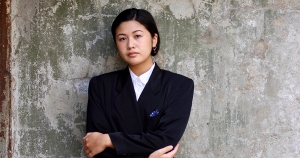About Australian Book Review (24)
Recruitment
Application for this position have now closed.
Australian Book Review seeks a new Editor and CEO
About Australian Book Review
Australian Book Review (ABR) seeks a new Editor and Chief Executive Officer to lead the country’s premier literary and cultural magazine.
ABR is a prestigious and successful organisation with deep roots in Australian cultural life. It is diverse in terms of content, platforms, writers, and partners. It provides a needed forum for new Australian writers and reviewers, and it is committed to delivering the highest standard of arts criticism in Australia.
ABR is an independent not-for-profit monthly magazine governed by an independent Board, managed by a small, skilled editorial and management team, and committed to the publication and promotion of creative and critical writing of the highest standard.
ABR publishes reviews, essays, commentaries, interviews and new creative writing by about 300 writers each year. The magazine is national in readership, authorship, distribution, events, and partners. It is available in print and online.
Through ABR Arts, the magazine engages with all the arts and reviews films, plays, operas, concerts, dance, festivals, and art exhibitions.
In recent years ABR has evolved in ways that distinguish it from most magazines. Innovations include a digital archive going back to 1978, writers’ fellowships, editorial cadetships, three international prizes, ABR Arts, political commentary, a weekly podcast, international tours, a remarkably successful Patrons program – and much more. We are seeking a visionary Editor and CEO to extend these programs and introduce new ones.
Job description
The Editor and CEO will lead a small, expert team, building on the magazine’s clear strengths in book reviews, political commentary, arts reviews, literary prizes, and cultural philanthropy.
The successful candidate will be a successful arts leader and/or publishing professional with an ambitious editorial vision and a deep knowledge of Australian literature, society, and the arts, and a strong appreciation of ABR’s unique place in Australian literary culture. Prior management and financial experience is essential, and experience with cultural philanthropy and/or grant applications and arts funding are desirable.
The Editor and CEO will be expected to lead all aspects of this small and vibrant organisation. The Editor and CEO reports to the Chair.
Based at the ABR office in Southbank, Melbourne, this is a full-time position with a four-year contract. The salary will be around $110,000, depending on experience, plus superannuation of 11.5%.
Application process
The application should comprise:
- a two-page Expression of Interest outlining why you are interested in the role, how you would approach the editorship of ABR, and your view of the organisation’s strengths and opportunities
- a detailed letter of two to four pages responding to the key criteria below
- a CV of no more than two pages
- the names of two referees
Shortlisted candidates will be asked to provide more details before the interviews, which are expected to take place in the second half of February 2025.
Key criteria
The application should address the following criteria and demonstrate experience and proficiency in these key areas:
- commissioning and publishing a monthly cultural magazine of diverse content and authorship in a timely, stimulating and engaging manner, and adhering to the highest editorial standards
- championing the value of literature and criticism, the arts and debate, in our society and to liaise with contributors, subscribers, donors and key stakeholders
- working closely with contributors, ranging from emerging to senior, established writers, and mentoring early-career publishing professionals
- utilising the full resources of digital publishing and promotion to expand ABR’s audience and engage readers across multiple platforms
- successfully managing and leading a small staff and liaising with the Board
- responsibly managing and extending fundraising, especially private donations, government funding, and grants from philanthropic foundations, and liaising with key stakeholders including contributors, subscribers, donors and partner organisations
- managing ABR in a financially prudent manner, according to best governance practice (budgets, commercial activities, including sales and advertising, with due accountability to the ABR board)
Applications and any associated queries should be sent to This email address is being protected from spambots. You need JavaScript enabled to view it. by 5 pm on Monday, 20 January 2025.
Media Contact
For all media related enquiries, please contact Pitch Projects on This email address is being protected from spambots. You need JavaScript enabled to view it.
ABR Rising Stars
2024, Vic.
ABR is delighted to name its sixth Rising Star – Sam Ryan, an emerging critic and early career researcher. Sam, who lives in Melbourne, is a PhD candidate at the University of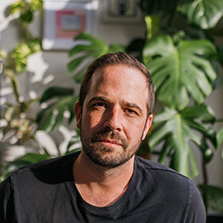 Sam Ryan (photograph by Bonnie Lavelle)Tasmania,where he is working on a thesis on the poetry in Overland and Quadrant. More broadly, he is interested in the genre of literary journal and its place in literary cultures. He has worked in publishing – in various functions – for more than a decade. He is Overland’s digital archivist and has a firm belief in the importance of digital preservation of literary journals. He has written for Australian Book Review, the Australian Journal of Biography and History, Cordite, and The Conversation.
Sam Ryan (photograph by Bonnie Lavelle)Tasmania,where he is working on a thesis on the poetry in Overland and Quadrant. More broadly, he is interested in the genre of literary journal and its place in literary cultures. He has worked in publishing – in various functions – for more than a decade. He is Overland’s digital archivist and has a firm belief in the importance of digital preservation of literary journals. He has written for Australian Book Review, the Australian Journal of Biography and History, Cordite, and The Conversation.
The Rising Stars program – generously funded by the ABR patrons – is intended to advance the careers of younger writers and critics whose earlycontributions to ABR have impressed readers and editors alike.
Peter Rose, Editor of ABR, commented:
I first became aware of Sam Ryan in January 2023 when he interviewed me for a survey of literary journals and organisations funded by Creative Australia and undertaken by the Sydney Review of Books. I was struck by his incisiveness and his digital savvy. Happily and cannily, Sam finds time for freelance reviewing around his PhD studies. Already he has written for us a few times. Sam’s interest in ABR – and its digital ambitions – has impressed us all.
On becoming our latest Rising Star, Sam Ryan commented:
Australian Book Review is such an important part of Australia’s literary culture, not only in terms of its critical input, which is undeniable, but also for the ways in which it encourages and nurtures new writing. Since working with the magazine, I have been taken aback by the care applied to all its endeavours. Peter Rose has in the past described the journal as ‘entrepreneurial’. I can’t think of a better description, nor can I imagine a more useful attribute in contemporary publishing. To be a part of the magazine – first as a contributor and now as a Rising Star – is truly an honour. I have such a passion for the written word, and I know the positive effect keen criticism has. I look forward to sharpening my writing with ABR’s guidance.
Recent writing for ABR:
Review of The Blue Cocktail by Audrey Molloy
Review of Icaros by Tamryn Bennett and Moon Wrasse by Willo Drummond
Review of 101 Poems by Ron Pretty
2021, QLD
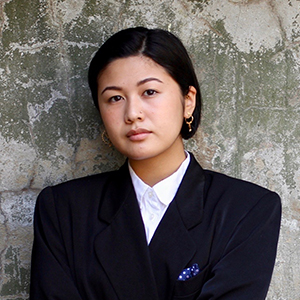 Mindy GillABR is pleased to announce its fifth Rising Star: Mindy Gill. A poet, critic, and former editor-in-chief of Peril magazine (2017–2020), Mindy is currently undertaking a PhD in Creative Writing at Queensland University of Technology. She has won the Queensland Premier’s Young Publishers and Writers Award and the Tom Collins Poetry Prize, as well as a number of prestigious international fellowships. Her collection of poems, August Burns the Sky, was shortlisted for the Thomas Shapcott Poetry Prize.
Mindy GillABR is pleased to announce its fifth Rising Star: Mindy Gill. A poet, critic, and former editor-in-chief of Peril magazine (2017–2020), Mindy is currently undertaking a PhD in Creative Writing at Queensland University of Technology. She has won the Queensland Premier’s Young Publishers and Writers Award and the Tom Collins Poetry Prize, as well as a number of prestigious international fellowships. Her collection of poems, August Burns the Sky, was shortlisted for the Thomas Shapcott Poetry Prize.
The Rising Stars program – generously funded by the ABR patrons – is intended to advance the careers of younger writers and critics whose early contributions to ABR have impressed readers and editors alike.
On becoming our latest Rising Star, Mindy Gill commented:
I am delighted to be named ABR’s fifth Rising Star; the confidence that the magazine has placed in me is an honour. I feel fortunate to write for a publication so dedicated to enriching the marketplace of ideas, especially in a cultural climate as tenuous as this one. But above all, I feel extraordinarily lucky to receive Peter Rose’s mentorship and guidance. Since I began writing for ABR, I have been moved by the staunch support Peter extends to his writers, and how strongly he values and encourages their independence of thought. I look forward to writing criticism that embodies the magazine’s rigour, fearlessness and uncompromising vision, and can think of no better place to cut my teeth as a young writer.
Peter Rose, Editor of ABR, commented:
ABR is acutely aware of the challenges facing freelance writers (especially younger ones) during the pandemic. The Rising Stars program assumes even greater importance as we mentor our best young writers and critics. Mindy Gill has made a real impression since joining the magazine in 2020. We look forward to working with our new Rising Star.
Recent writing for ABR:
Review of Racism edited by Winnie Dunn, Stephen Pham, and Phoebe Grainer
Review of Revenge: Murder in three parts by S.L. Lim
Review of We Were Never Friends by Margaret Bearman
2021, Vic.
 Anders Villani (photograph by Jesper Hede)ABR is delighted to introduce its fourth Rising Star – Anders Villani. Anders began writing for ABR in late 2020, soon after taking part in an ABR publishing masterclass. He holds an MFA from the University of Michigan’s Helen Zell Writers’ Program, where he received the Delbanco Prize for poetry. His first full-length collection, Aril Wire, was released in 2018 by Five Islands Press. A PhD Candidate in Creative Writing at Monash University, he lives in Melbourne; his doctoral research concerns poetic representations of trauma.
Anders Villani (photograph by Jesper Hede)ABR is delighted to introduce its fourth Rising Star – Anders Villani. Anders began writing for ABR in late 2020, soon after taking part in an ABR publishing masterclass. He holds an MFA from the University of Michigan’s Helen Zell Writers’ Program, where he received the Delbanco Prize for poetry. His first full-length collection, Aril Wire, was released in 2018 by Five Islands Press. A PhD Candidate in Creative Writing at Monash University, he lives in Melbourne; his doctoral research concerns poetic representations of trauma.
The Rising Stars program is intended to advance the careers of younger writers and critics whose early contributions to ABR have impressed readers and editors alike.
On becoming our latest Rising Star, Anders Villani commented:
What began as an ABR masterclass at Monash University has bloomed into perhaps the most enriching partnership yet in my artistic and intellectual life – and now this extraordinary accolade. Poetry has been at the heart of my involvement with the magazine: as a reviewer; as a creative contributor; and, most recently, as assistant poetry editor. In each of these capacities, I have witnessed and benefited from ABR’s invaluable ongoing commitment to poetry in Australia. As the new Rising Star, I consider it my mandate to deepen that commitment, and I am so excited and honoured to get to work. In a precarious cultural landscape, ABR offers a beacon, as it has for generations. That it has not only survived the pandemic but grown stronger is a testament to its resilience and importance. I could not have wished for a better platform for doing what I love.
Recent writing for ABR:
Review of Prose Poetry: An introduction by Paul Hetherington and Cassandra Atherton
'Marlin', a new poem by Anders Villani
Review of three new poetry collections by Luke Best, Todd Turner, and Angela Gardner
2020, Vic.
 ABR is delighted to name its third Rising Star, Declan Fry. The Rising Stars program is intended to encourage younger writers and critics whose early contributions to ABR have made an impression. We work closely with the Rising Stars, commissioning them often and helping them to enhance their critical work and to advance their careers.
ABR is delighted to name its third Rising Star, Declan Fry. The Rising Stars program is intended to encourage younger writers and critics whose early contributions to ABR have made an impression. We work closely with the Rising Stars, commissioning them often and helping them to enhance their critical work and to advance their careers.
On becoming our latest Rising Star, Declan Fry commented:
We live in a continent rich with stories. Many of these are still being told, and deserve to be widely heard. One of my earliest memories of writing publications was seeing ABR down at the local library. In a difficult environment for the arts, ABR’s support for new and emerging talent is vital. To be able to connect with ABR having never published or worked with literary journals before speaks volumes, especially during the isolation of this pandemic. Opportunities like the Rising Stars initiative are a great privilege – a place to hone your writing practice, and to develop a long-term investment in the work. It gives me a real sense of hope knowing that there is a space for considered, thoughtful analysis. This opportunity would mean nothing without those who have paved the way – our ancestors, Elders, family, mentors, and teachers. They are the original critics and storytellers. We owe them so much. I can’t wait to get started! Much love and stay deadly, ABR.
About Declan Fry
Declan Fry is an essayist, critic, and proud descendant of the Yorta Yorta. Born on Wongatha country in Kalgoorlie, in 2009 he received the Tom Collins Prize in Australian Literature, and, as joint winner, the Todhunter Literary Award in 2013. He currently lives on unceded Wurundjeri and Boon Wurrung land and is a board member of Books ‘n’ Boots, an organisation which distributes football boots and books to remote and regional Aboriginal communities. He first published in ABR in June 2020.
Recent writing for ABR:
Review of After Australia edited by Michael Mohammed Ahmad
Review of Fire Front: First Nations poetry and power today edited by Alison Whittaker
Review of Elephants with Headlights by Bem Le Hunte
Previous Rising Stars
2019, NSW
Alex Tighe
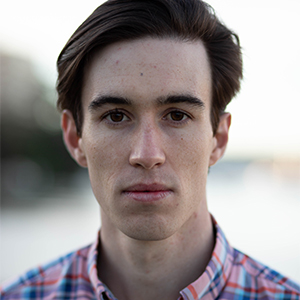 Alex Tighe is a writer and editor, and the winner of the University of Sydney’s 2018 Wentworth Medal essay prize. He is the ABC / Kidney Health Australia’s inaugural Mark Colvin Scholar.
Alex Tighe is a writer and editor, and the winner of the University of Sydney’s 2018 Wentworth Medal essay prize. He is the ABC / Kidney Health Australia’s inaugural Mark Colvin Scholar.
Recent writing for ABR:
Review of Stop Being Reasonable by Eleanor Gordon-Smith
Review of Delayed Response by Jason Farman
Review of Net Loss by Sebastian Smee
2019, Vic.
Sarah Walker
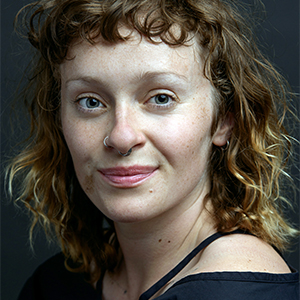 Sarah Walker is a Melbourne-based writer, photographer, and fine artist. In 2017 she won the Sydney Road Writer’s Cup and the Sydney Road Storytelling Prize, and was a runner-up in the Darebin Mayor’s Writing Award. She was runner-up in the 2019 Calibre Essay Prize.
Sarah Walker is a Melbourne-based writer, photographer, and fine artist. In 2017 she won the Sydney Road Writer’s Cup and the Sydney Road Storytelling Prize, and was a runner-up in the Darebin Mayor’s Writing Award. She was runner-up in the 2019 Calibre Essay Prize.
Recent writing for ABR:
Review of Sky Swimming: Reflection on auto/biography, people and place by Sylvia Martin
'Contested breath: The ethics of assembly in an age of absurdity' by Sarah Walker
2019 Calibre Essay Prize (runner-up): 'Floundering' by Sarah Walker
ABR Publishing Profile
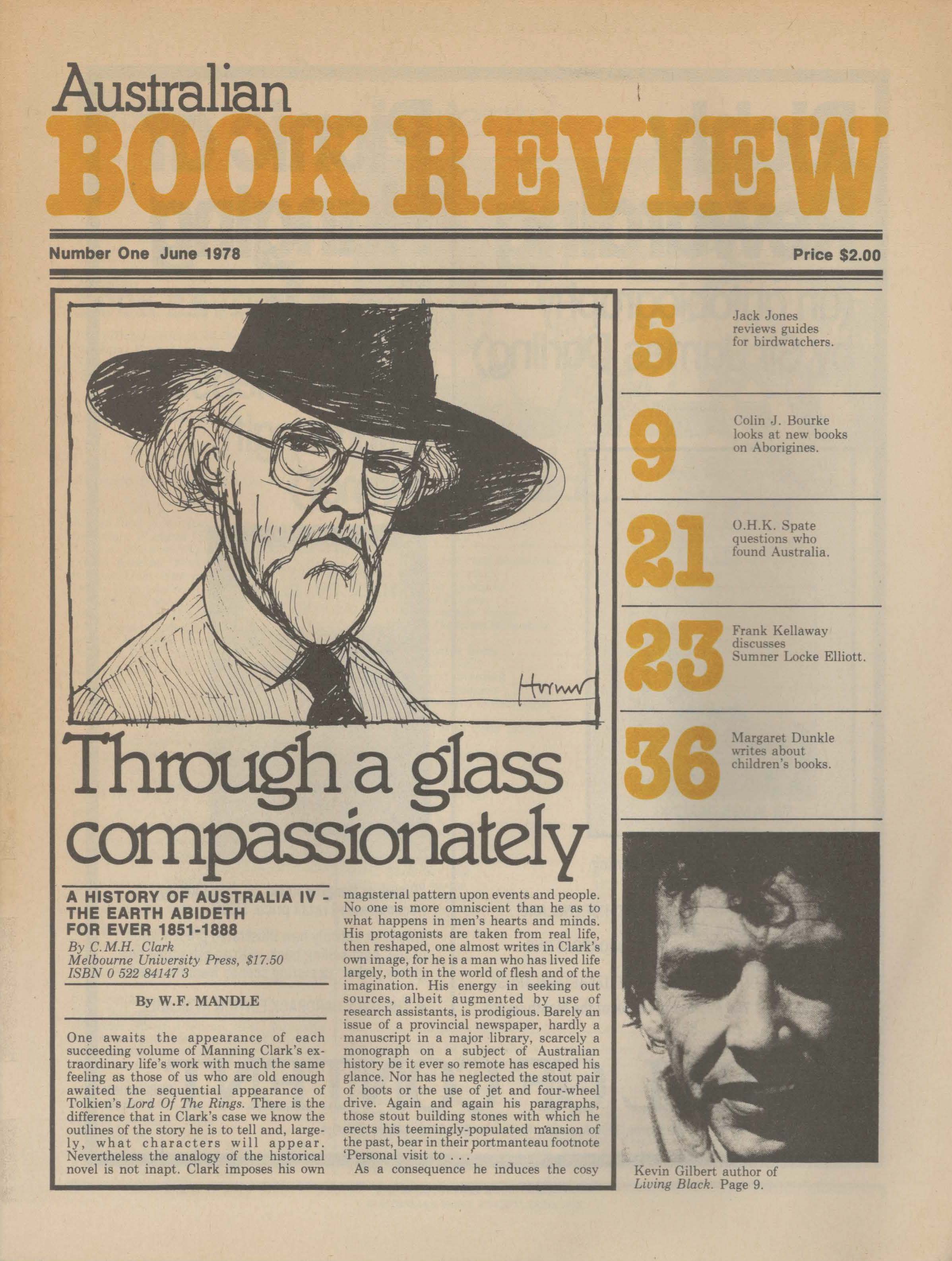 Issue #1, June 1978Australian Book Review is one of the country’s leading cultural magazines. Founded in 1961 in Adelaide and revived in Melbourne in 1978, it is an independent, not-for-profit magazine committed to publishing critical and creative writing of the highest standard. Through its print and digital publishing, website, prizes, fellowships, events, and partnerships, ABR makes a major contribution to Australia’s culture of ideas.
Issue #1, June 1978Australian Book Review is one of the country’s leading cultural magazines. Founded in 1961 in Adelaide and revived in Melbourne in 1978, it is an independent, not-for-profit magazine committed to publishing critical and creative writing of the highest standard. Through its print and digital publishing, website, prizes, fellowships, events, and partnerships, ABR makes a major contribution to Australia’s culture of ideas.
The magazine publishes in-depth literary and arts reviews as well as new poetry and fiction, essays, commentaries, and interviews. ABR also reviews films, television, music, theatre, opera, dance, festivals, and art exhibitions.
ABR is a strong advocate of proper support and remuneration for freelance reviewers. We pay for everything we publish – print and online – and we pay increasingly well.
ABR is a powerful generator of ideas and creative writing, and a key supporter of fresh talent. Few publications support writers and editors through such varied and lucrative programs.
Editors
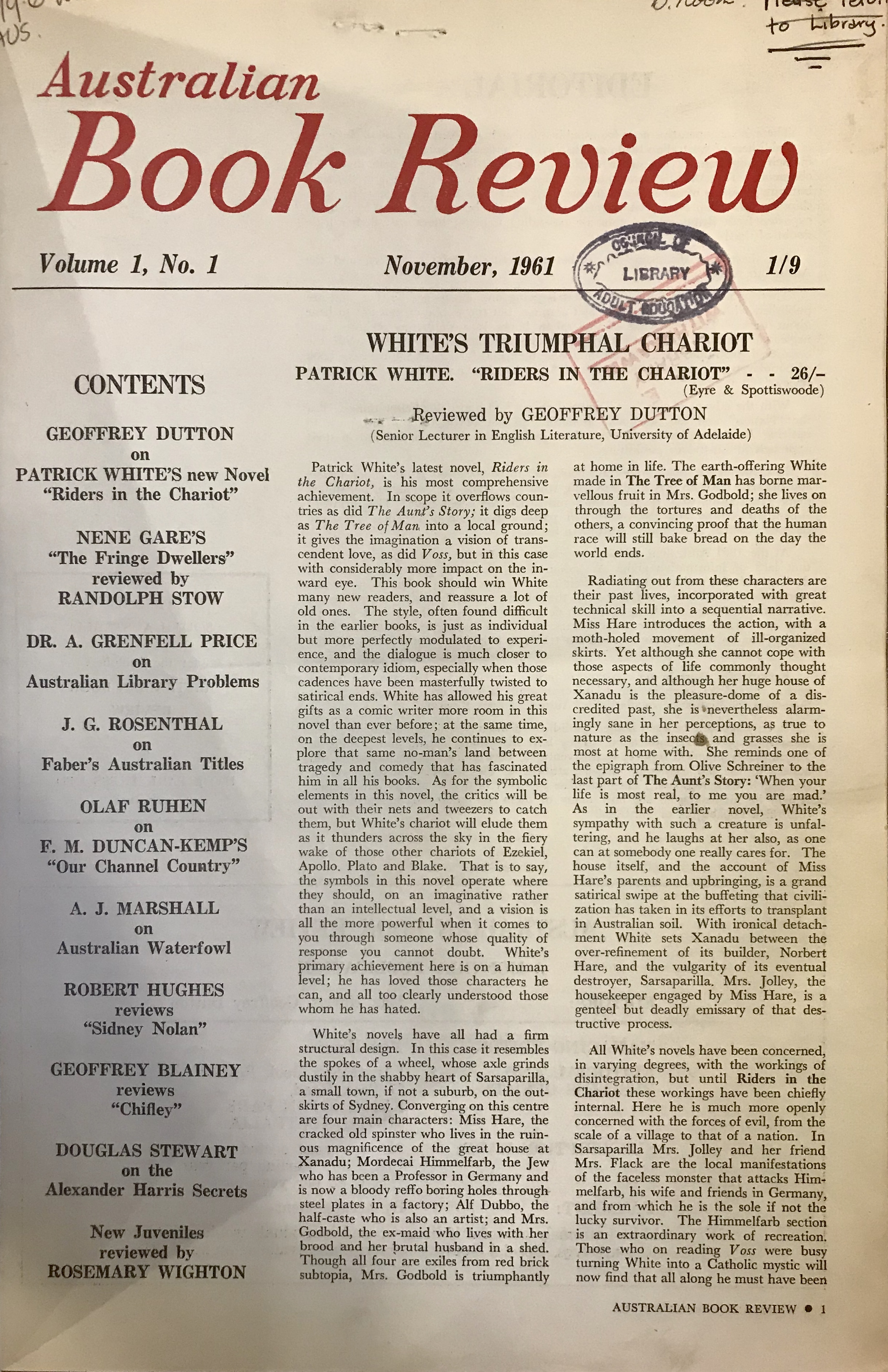 First issue, 1961 (series one)First Series
First issue, 1961 (series one)First Series
1961 to 1974 - Geoffrey Dutton, Max Harris, and Rosemary Wighton
Second series:
1986 to 1987 - Kerryn Goldsworthy
1988 - Louise Adler
1989 to 1995 - Rosemary Sorensen
1995 to 2000 - Helen Daniel
2001 to present day - Peter Rose
Find out more about ABR Staff, the ABR Board, the ABR Laureates, and contributors to the first and second series. A timeline of major events from ABR’s history can be found here.
ABR Print Publishing
ABR publishes reviews, commentaries, interviews, essays, surveys, and creative writing. In general ABR publishes approximately 500 features in print each year by 300 contributors. Roughly 90 or 100 of these contributors will be new to the magazine. ABR is open to approaches from new contributors and you can find out more here. ABR publishes an annual index of our print content here (from 2017 we have also indexed our digital content). Prior to 2021, ABR published ten issues per year. In June 2021, we added an eleventh issue.
ABR Print Edition Statistics and Gender Breakdown
Below is a gender breakdown from the print edition between 2014 and 2022. (NB this table only includes information about items published in the print edition. It does not include our wider digital content. Statistics on non-binary contributors are only included when known.)
|
Year |
Features published in the print edition |
Percentage of those features written by: |
Number of new contributors |
||
|
Men |
Women |
Non-binary authors |
|||
|
2014 |
457 |
56% |
44% |
|
91 |
|
2015 |
536 |
60% |
40% |
|
103 |
|
2016 |
501 |
61% |
39% |
|
74 |
|
2017 |
501 |
57% |
43% |
|
88 |
|
2018 |
530 |
54% |
46% |
|
93 |
|
2019 |
485 |
52% |
48% |
|
83 |
|
2020 |
492 |
53% |
46% |
1% |
82 |
|
2021 |
494 |
51% |
48% |
1% |
76 |
|
2022 |
463 |
54% |
45% |
1% |
71 |
Interviews
We have published 181 interviews with a wide range of authors, critics, poets, and publishers including Tim Winton, Maxine Beneba Clarke, Geraldine Brooks, Hazel Rowley, Carmen Callil, and Sheila Fitzpatrick.
- 94 of these interviews are with women; 87 are with men,
- We have published 17 Critic of the Month interviews, 115 Open Page interviews, 28 Poet of the Month interviews, and 21 Publisher of the Month interviews.
Surveys
ABR regularly publishes surveys of groups of critics, publishers, and commentators on a range of subjects including the following: Books of the Year, Arts Highlights of the Year, and Publisher Picks.
The ABR Favourite Australian Novel polls
Back in 2009, when we sought readers’ nominations for the ABR Favourite Australian Novel (any era, any genre), we anticipated goodly interest, ABR readers being a passionate and well-read bunch. But we hadn’t expected to be inundated with quite so many faxes and emails. In the end we received thousands of votes for some 290 Australian novels. Tim Winton’s Cloudstreet, a perennial favourite since its publication in 1991, was the overwhelming favourite – by a margin of three to one to its nearest rival, Henry Handel Richardson’s The Fortunes of Richard Mahony, which was closely followed by Patrick White’s Voss and Winton’s most recent novel, Breath. Particularly heartening was the large number of nineteenth-century novels and those published before the remarkable expansion of fiction publishing in the last quarter of the twentieth century. The following feature, which appeared in the February 2010 issue, lists the top twenty Favourite Australian Novels.
In 2019 we asked readers to nominate their Favourite Australian Novel published since 2000.
Advocacy and engagement
ABR, though not politically aligned, is an engaged and responsive magazine. From time to time, we publish open letters on key social or political questions. These include an Open Letter on Marriage Equality and an Open Letter on the importance of saving the ABC.
ABR Online Exclusives
Not all ABR’s publishing appears in the print magazine. We publish a wide range of online exclusives and previews including book and arts reviews, creative writing, essays and interviews, and podcasts. These appear online in ABR Arts, States of Poetry, Reading Australia, ABR Fiction, Book Talk, and ABR Online Exclusives. Some additional articles also appear as online exclusives in recent online issues of the magazine.
Prizes and Programs
ABR presents three prestigious international literary prizes (for poetry, essays and short stories), a vibrant Fellowship program, and a prestigious Laureate’s program. We also offer regular paid Editorial Internships.
Laureates
To recognise the work of distinguished Australian artists, ABR has to date named three ABR Laureates.
- David Malouf (2014)
- Robyn Archer (2016)
- Sheila Fitzpatrick (2023)
Fellows
Since 2011 ABR has awarded twenty-one Fellowships to twelve women and nine men. The Fellows are listed below under the year of publication. Find out more about the Published and current Fellows and read their essays.
Since 2009 ABR has awarded eight paid Editorial Internships as part of our highly successful program. The most recent ABR Editorial Intern was Jack Callil. In 2021, with support from the Judith Neilson Institute for Journalism and Ideas, ABR offered a paid Editorial Cadetship. The first of these ABR Editorial Cadets was James Jiang. Find out more about past Editorial Cadets and Interns. Since 2010 ABR has awarded the Jolley Prize to fifteen writers (the prize was shared in 2011). Forty-seven writers have been shortlisted for the prize. As with all our prizes the Jolley Prize is judged blind. Since 2010 ABR has shortlisted thirty-five women, eleven men, and one non-binary author. Since the prize was internationalised in 2014 we have shortlisted ten writers from overseas. The winners and shortlisted authors are listed below. Find out more about the past winners of the Jolley Prize and read their stories via our Past Winners page.
Since 2007 ABR has awarded the Calibre Essay Prize to twenty-one writers (the prize was shared in 2008, 2009, 2010, and 2011). Calibre was internationalised in 2015 and as with all our prizes it is judged blind. Since 2010 the Calibre Prize has been won by eleven men, nine women, and one non-binary author. The winning authors are listed below. In 2017 ABR introduced a second prize and this has been won by six women and one man. Find out more about the past winners of the Calibre Prize via our Past Winners page
Since 2005 ABR has awarded the Peter Porter Poetry Prize to twenty-two writers (the prize was shared in 2011, 2017, and 2019) and 101 poems have been shortlisted for the prize. As with all our prizes the Porter Prize is judged blind. Since 2010 ABR has shortlisted fifty-two poems by men and forty-nine poems by women. Since the prize was internationalised in 2014 we have shortlisted twelve writers from overseas. The winners and shortlisted authors are listed below. Find out more about the past winners of the Porter Prize and read their poems via our Past Winners page.
Many past ABR prize shortlisted entrants have gone on to publish full-length works (novels, short story collections, films etc) based on, or including, their shortlisted or winning works. We have listed some of these below.
ABR commissioned and published twenty-six essays on major Australian writers as part of the Australia Council’s Reading Australia project. These essays are all available open access online.
Between 2016 and 2018 ABR published nearly four hundred poems by eighty poets as part of States of Poetry, a federally arranged poetry anthology supported by Copyright Agency Limited that also included podcasts. Anthologies were published by poets from New South Wales, Victoria, Western Australia, Tasmania, Queensland and the ACT. These anthologies are all open access. The poets and state editors are listed below.
The statistics listed above were last updated on 16 October 2023. The information on this page will continue to be updated and expanded over time.ABR Editorial Internships
ABR Elizabeth Jolley Short Story Prize
Calibre Essay Prize
Peter Porter Poetry Prize
From Prize to Publication
Reading Australia
States of Poetry
Editorial note
ABR Photos
The following photos record key events, prizes, ceremonies, tours, and personalities since 2001. Australian Book Review holds copyright in all these photos but no permission is required to reproduce them. We seek acknowledgment that Australian Book Review is the copyright holder. For higher resolution versions of the images, please email This email address is being protected from spambots. You need JavaScript enabled to view it.
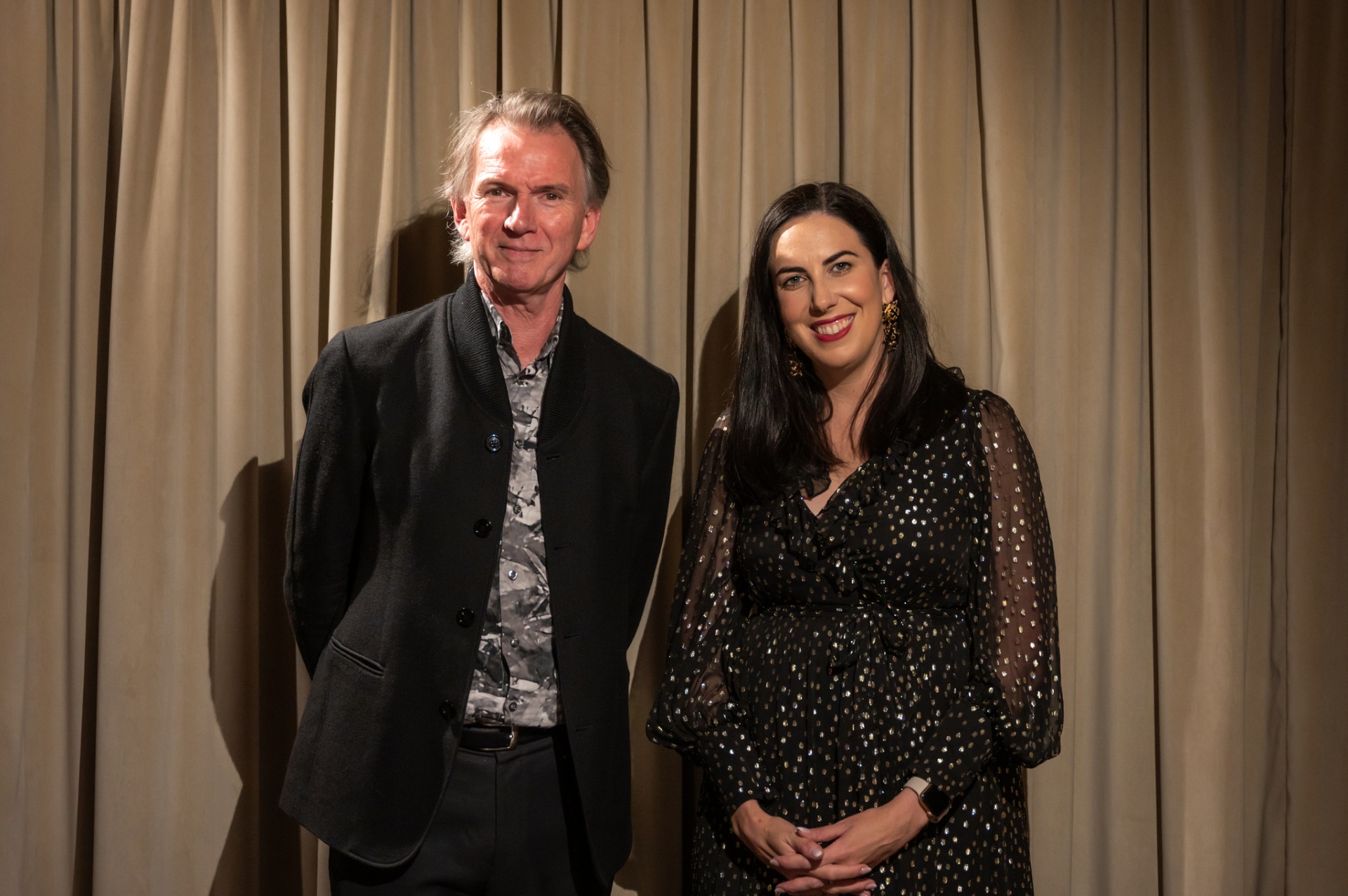 Peter Rose and Sarah Holland-Batt at an ABR function in Sydney
Peter Rose and Sarah Holland-Batt at an ABR function in Sydney
 Dan Disney, winner of the 2023 Peter Porter Poetry Prize, at ABR
Dan Disney, winner of the 2023 Peter Porter Poetry Prize, at ABR
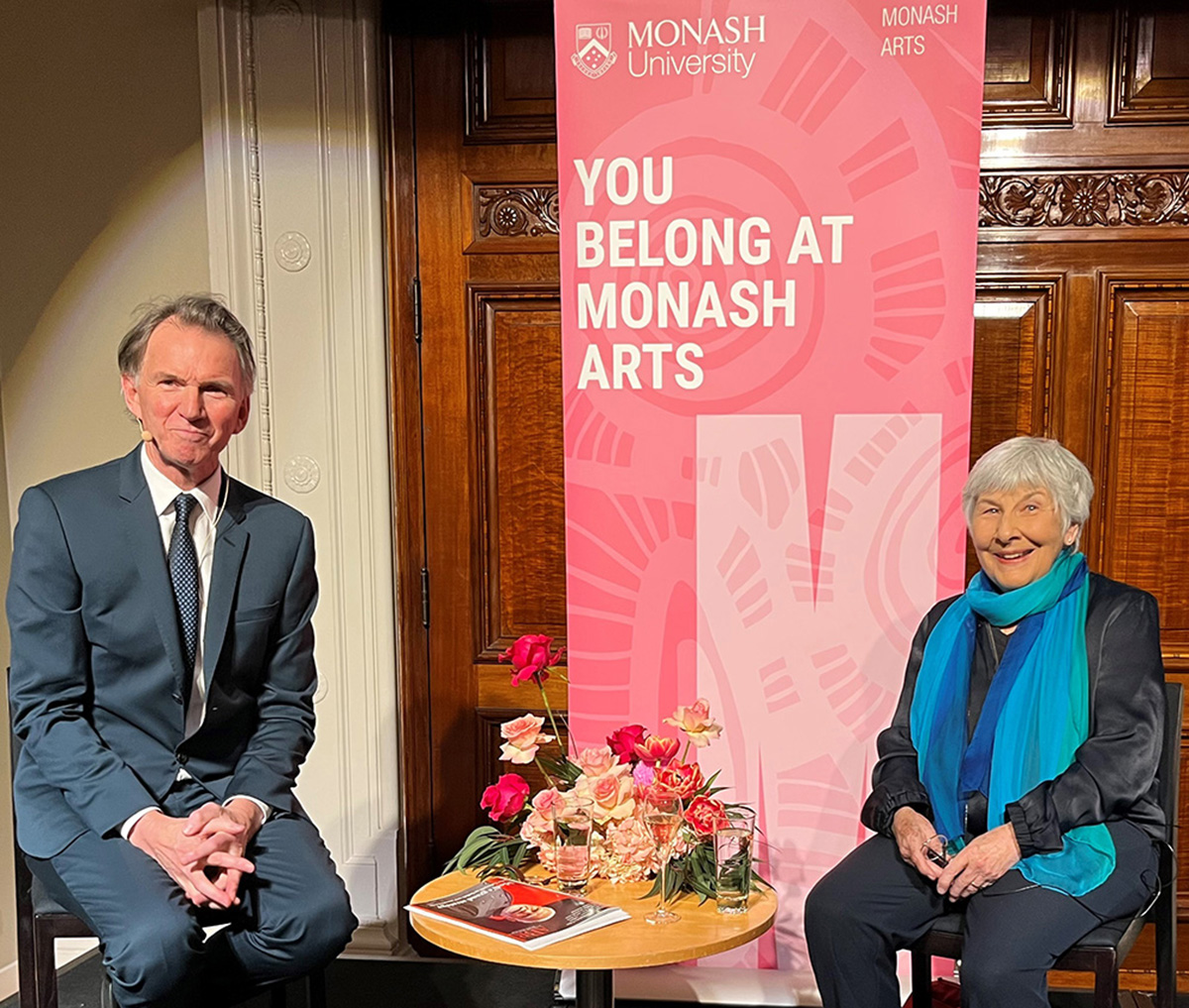 Peter Rose and Sheila Fitzpatrick in conversation at the State Library of Victoria as Fitzpatrick becomes the third ABR Laureate, 2023.
Peter Rose and Sheila Fitzpatrick in conversation at the State Library of Victoria as Fitzpatrick becomes the third ABR Laureate, 2023.
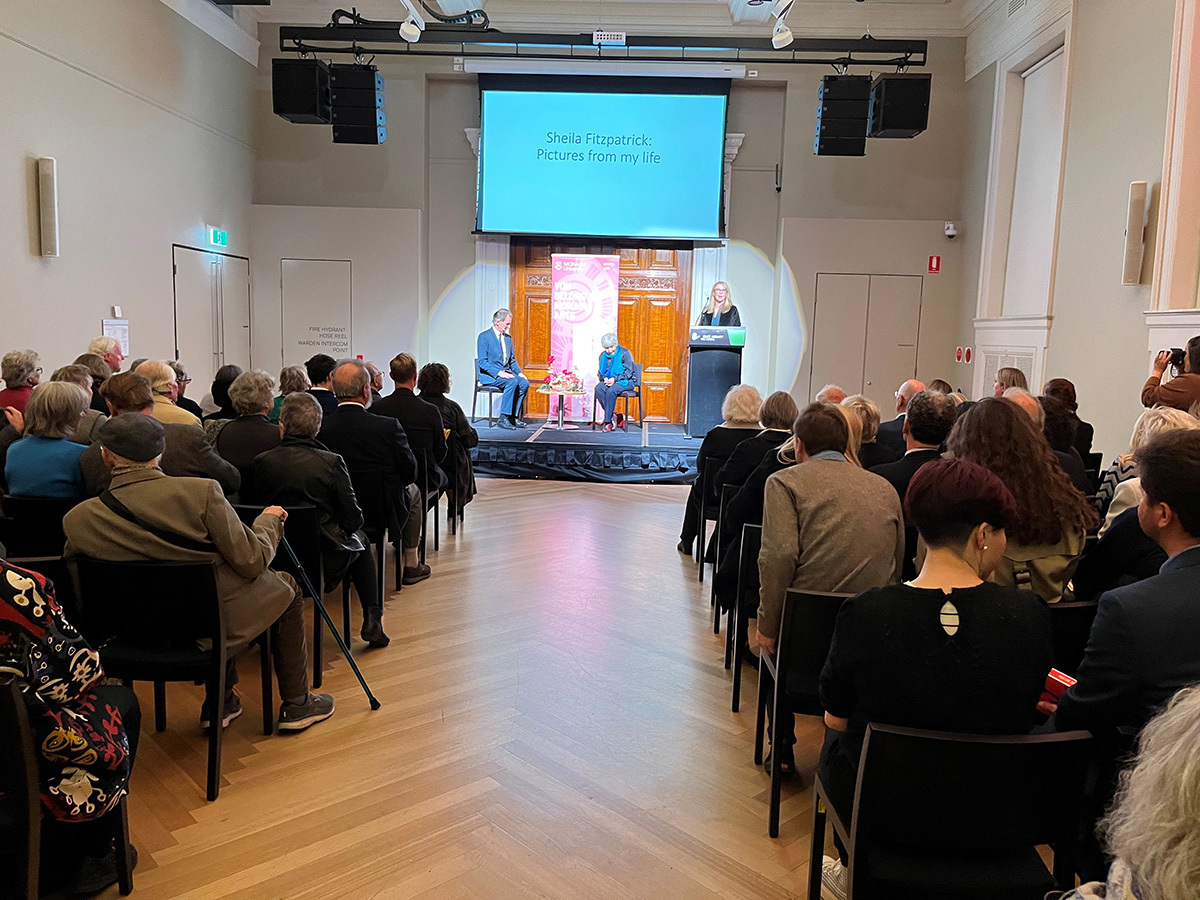 Peter Rose, Sheila Fitzpatrick and Monash Dean of Arts Katie Stevenson at the Laureate event at the State Library of Victoria, 2023.
Peter Rose, Sheila Fitzpatrick and Monash Dean of Arts Katie Stevenson at the Laureate event at the State Library of Victoria, 2023.
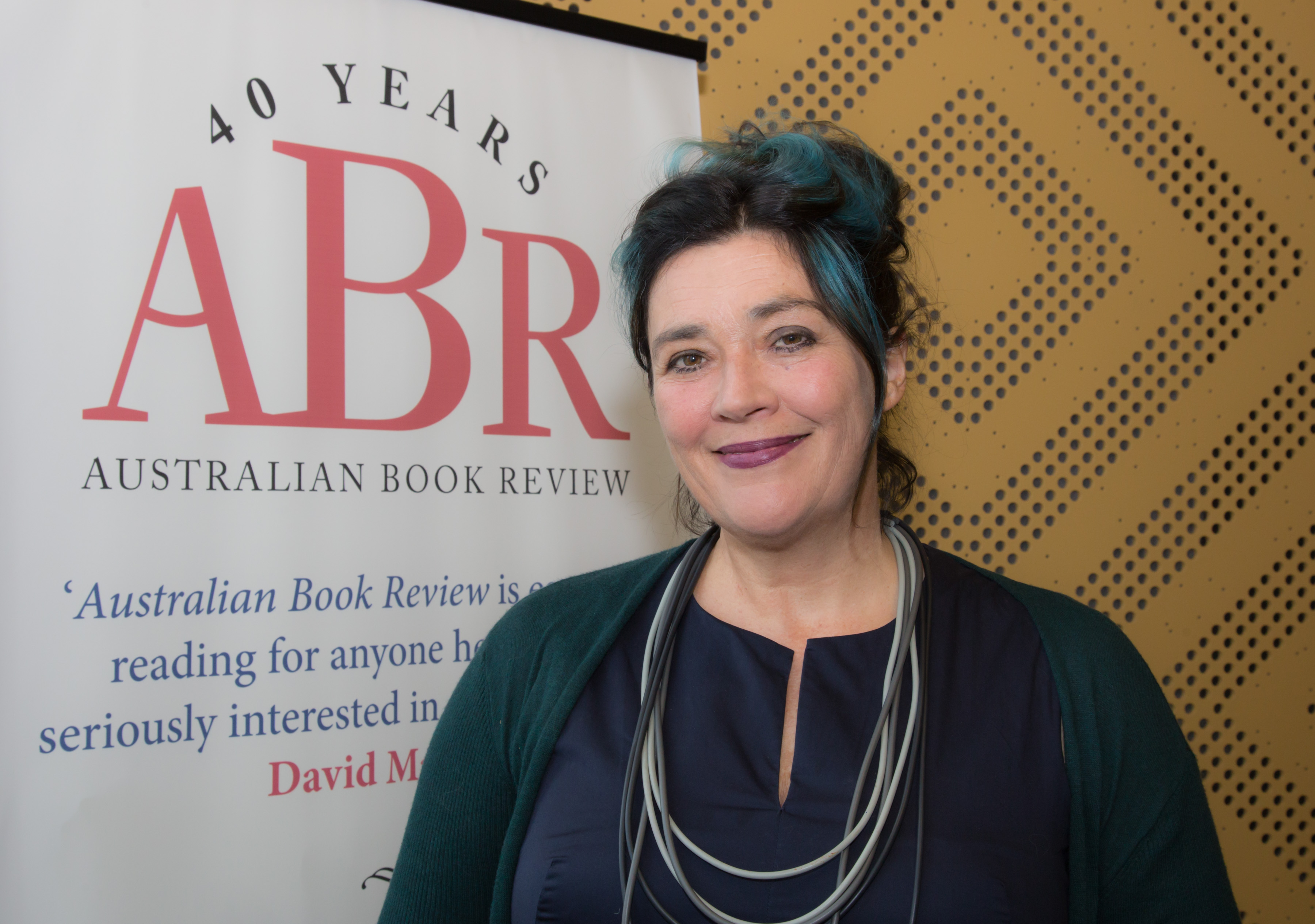 A. Frances Johnson wins the 2020 Peter Porter Poetry Prize (photograph by David Johns)
A. Frances Johnson wins the 2020 Peter Porter Poetry Prize (photograph by David Johns)
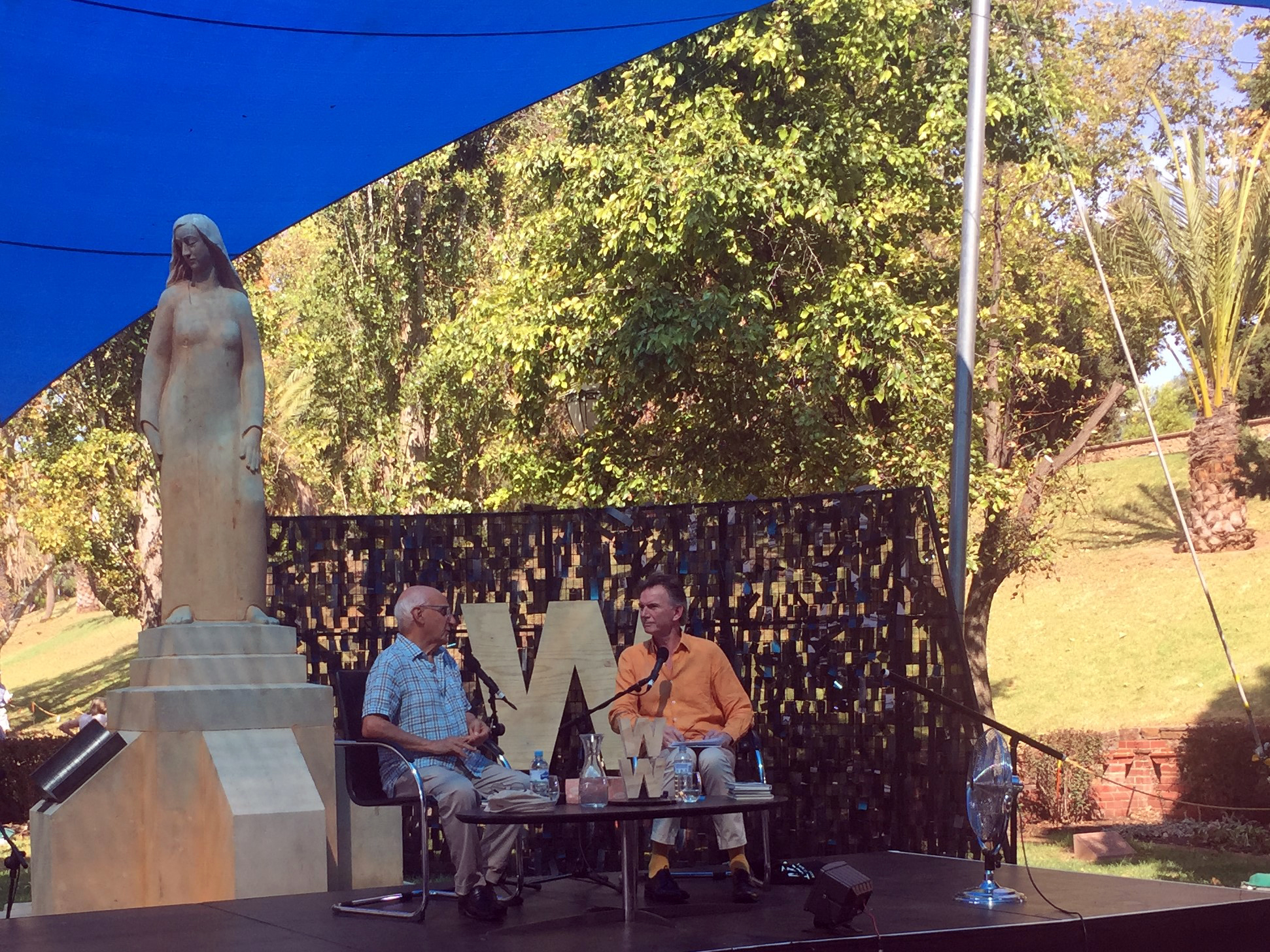 Peter Rose interviews ABR Laureate David Malouf in Adelaide, 2019
Peter Rose interviews ABR Laureate David Malouf in Adelaide, 2019
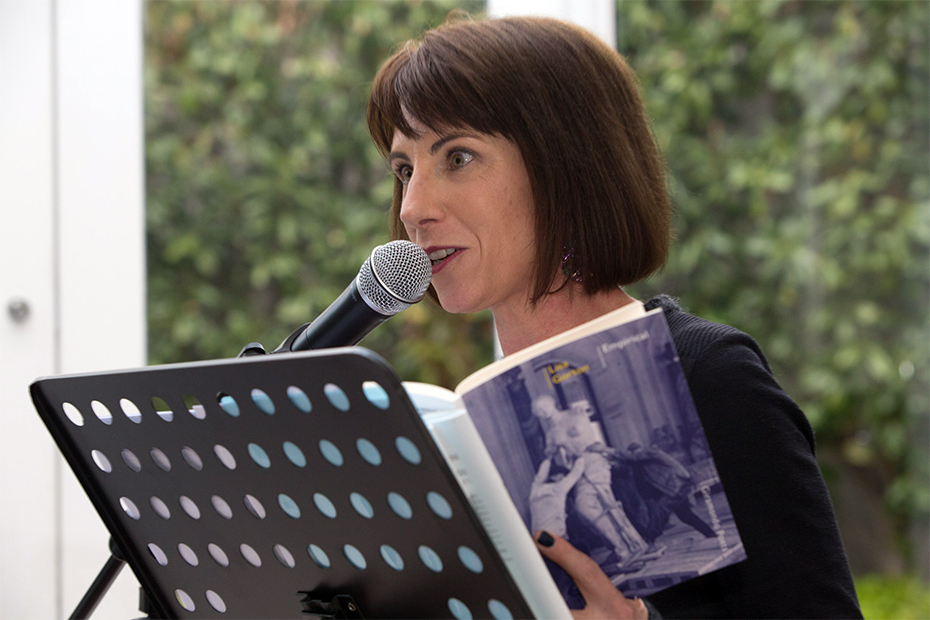 Lisa Gorton speaks at an ABR function, 2019
Lisa Gorton speaks at an ABR function, 2019
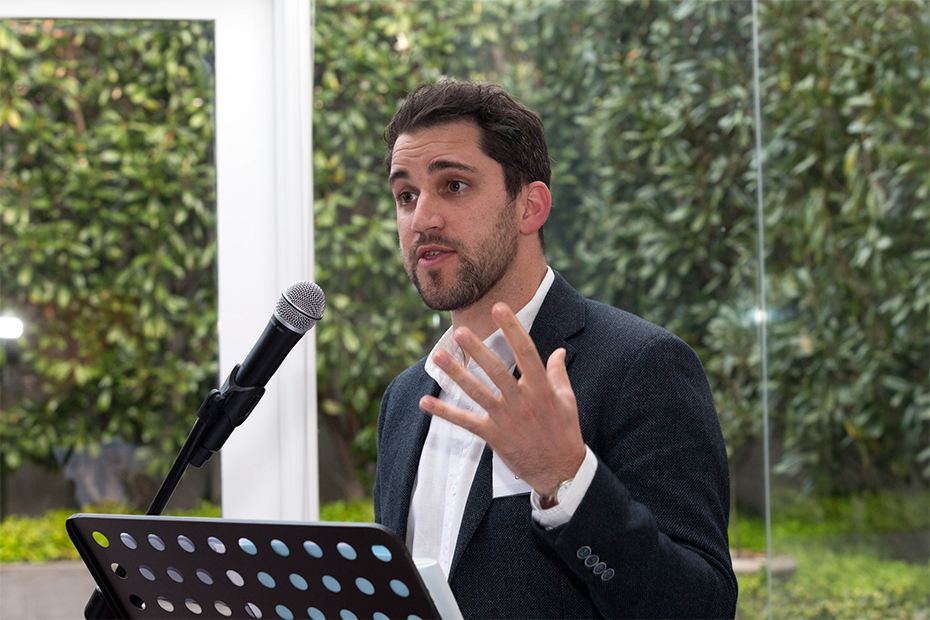 Billy Griffiths speaks at an ABR function, 2019
Billy Griffiths speaks at an ABR function, 2019
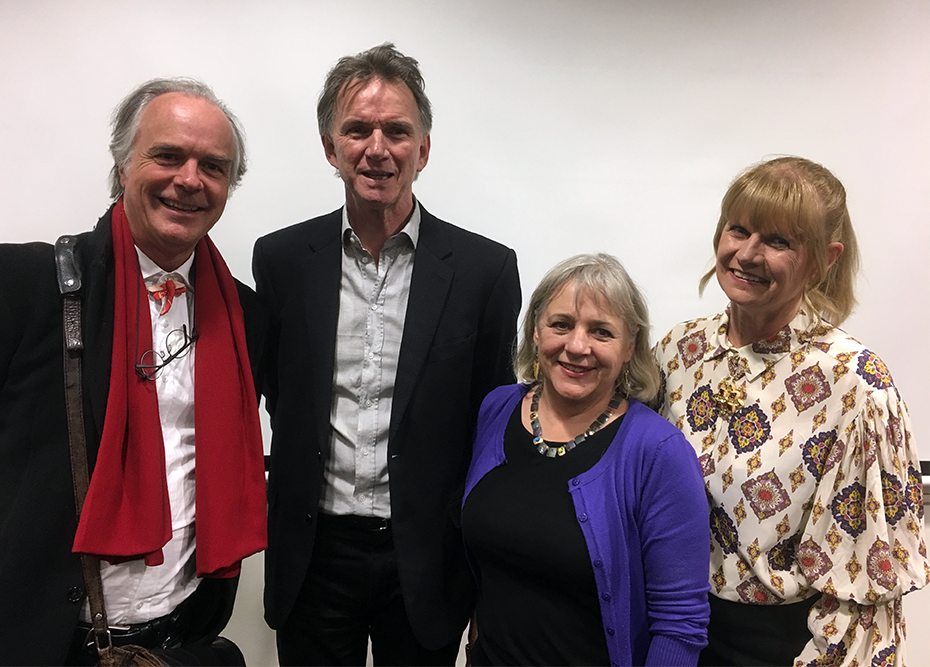 (L-R): Peter Rose with Rae Frances (centre) and Calibre Essay Prize winners David Hansen and Grace Karskens, August 2019
(L-R): Peter Rose with Rae Frances (centre) and Calibre Essay Prize winners David Hansen and Grace Karskens, August 2019
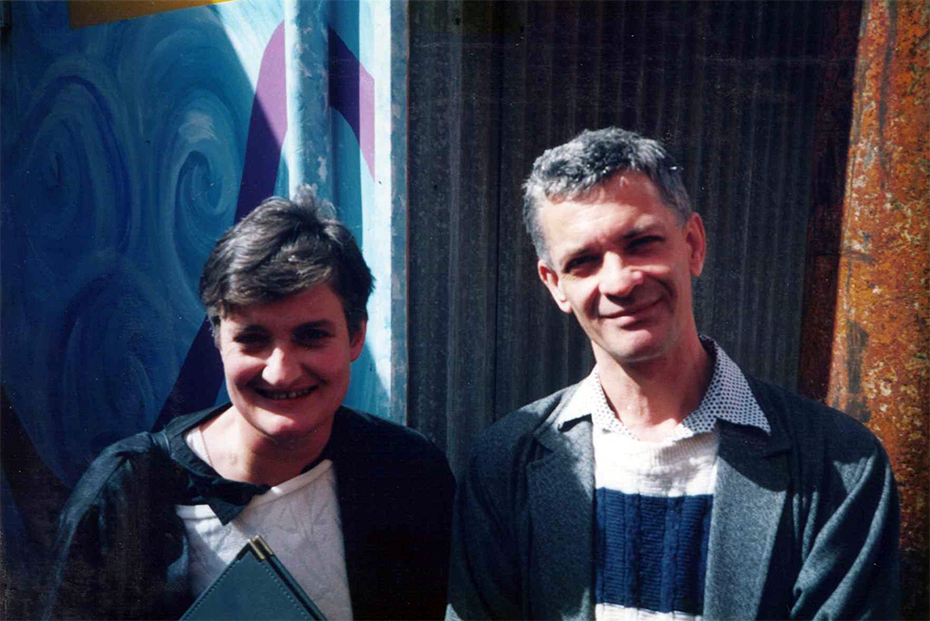 Helen Daniel (Editor of ABR 1995–2000) with Robert Dessaix, a contributor since 1981
Helen Daniel (Editor of ABR 1995–2000) with Robert Dessaix, a contributor since 1981
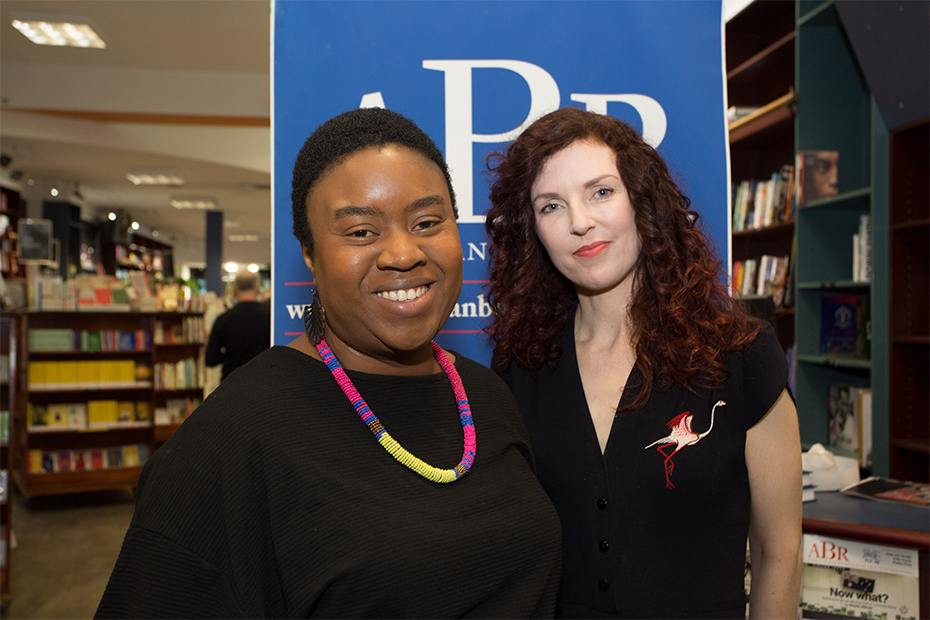 Judge Maxine Beneba Clarke and Jolley Prize winner Sonja Dechian at the 2019 Jolley Prize ceremony (photograph by Daniel O'Brien)
Judge Maxine Beneba Clarke and Jolley Prize winner Sonja Dechian at the 2019 Jolley Prize ceremony (photograph by Daniel O'Brien)
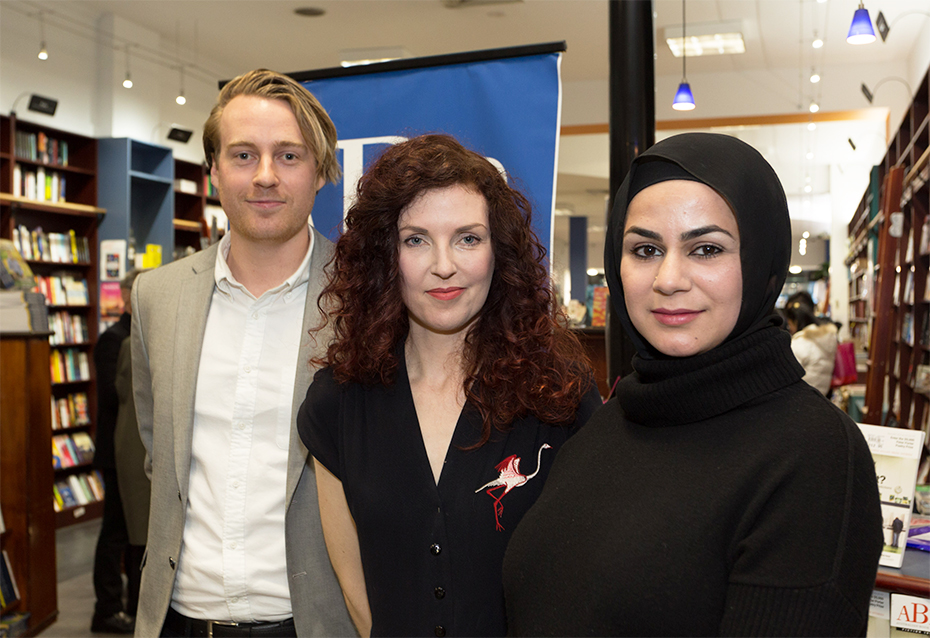 2019 Jolley Prize shortlist (L-R): Morgan Nunan, Sonja Dechian, Raaza Jamshed (photograph by Daniel O'Brien)
2019 Jolley Prize shortlist (L-R): Morgan Nunan, Sonja Dechian, Raaza Jamshed (photograph by Daniel O'Brien)
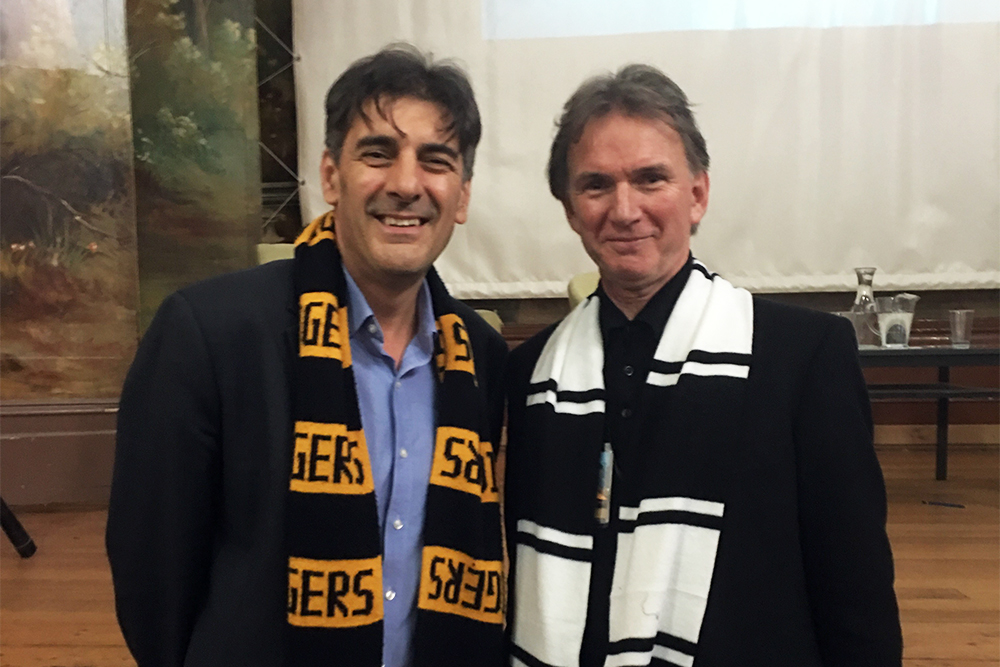 Peter Rose interviews George Megalogenis at Clunes Booktown Festival, 2019
Peter Rose interviews George Megalogenis at Clunes Booktown Festival, 2019
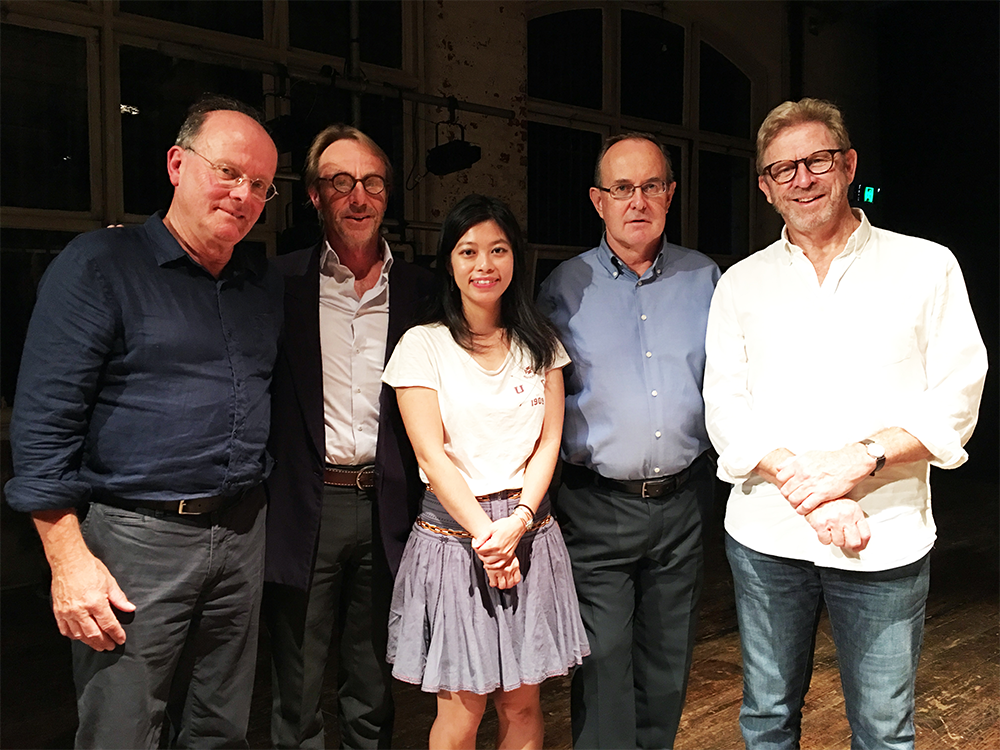 The 2019 Porter Prize shortlist: Ross Gillett, Mark Tredinnick, Belle Ling, Andy Kissane, and John Foulcher
The 2019 Porter Prize shortlist: Ross Gillett, Mark Tredinnick, Belle Ling, Andy Kissane, and John Foulcher
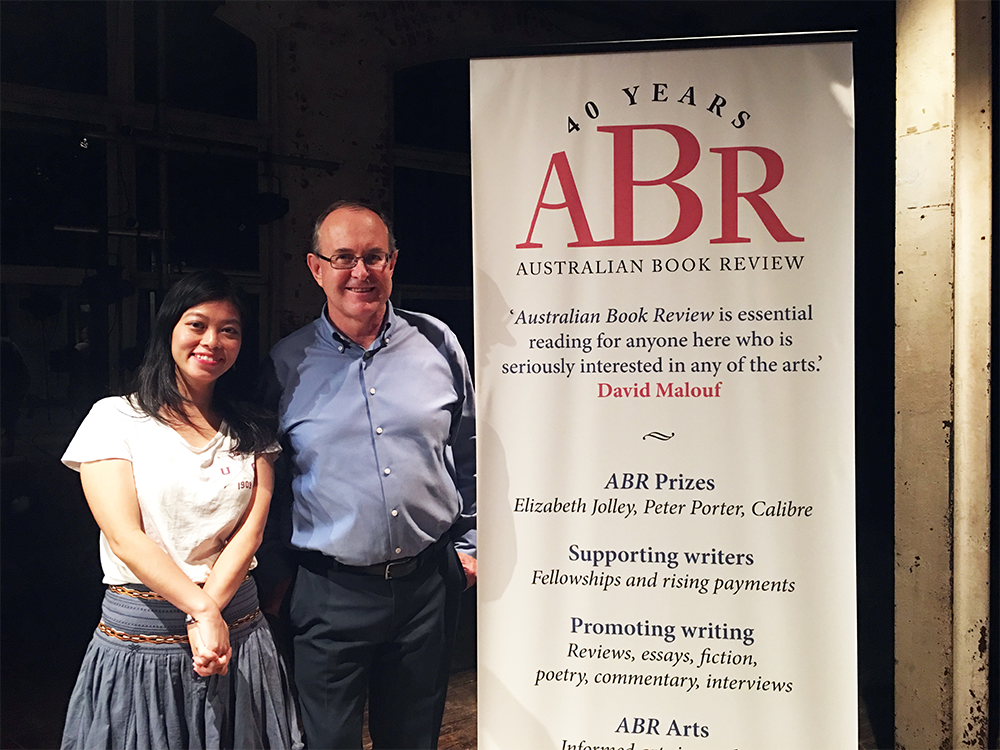 The 2019 Porter Prize joint winners: Belle Ling and Andy Kissane
The 2019 Porter Prize joint winners: Belle Ling and Andy Kissane
 ABR Fellow Beejay Silcox in Cairo, Egypt (November, 2018)
ABR Fellow Beejay Silcox in Cairo, Egypt (November, 2018)
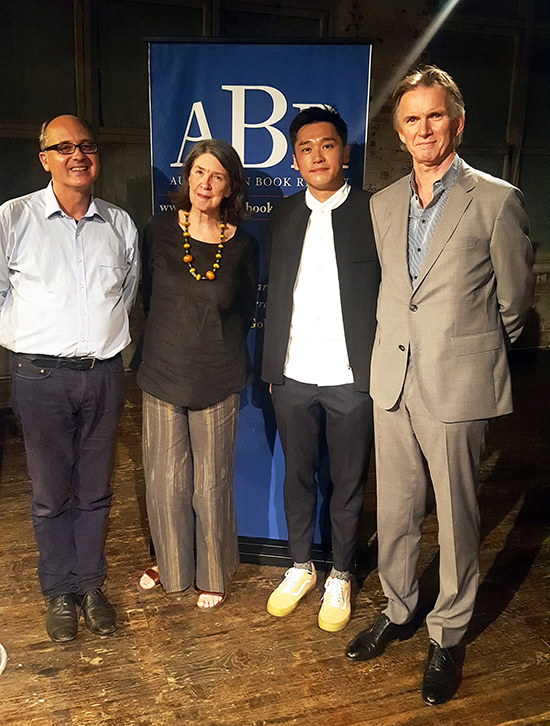 John Hawke Morag Fraser Nicholas Wong Peter Rose Porter Prize event 2018
John Hawke Morag Fraser Nicholas Wong Peter Rose Porter Prize event 2018
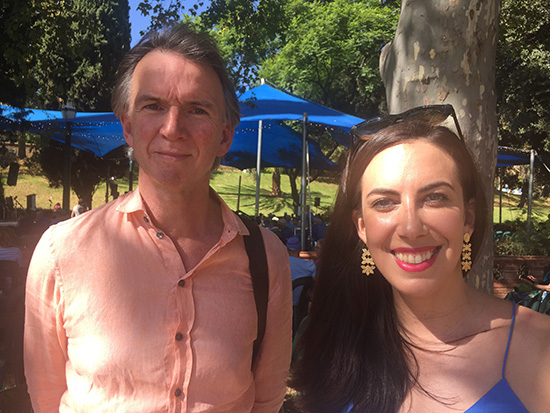 Peter Rose and Sarah Holland Batt at Writers Week 2018
Peter Rose and Sarah Holland Batt at Writers Week 2018
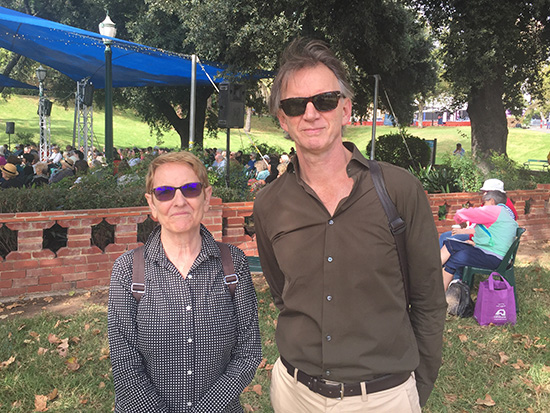 Peter Rose and Pam Brown at Writers Week 2018
Peter Rose and Pam Brown at Writers Week 2018
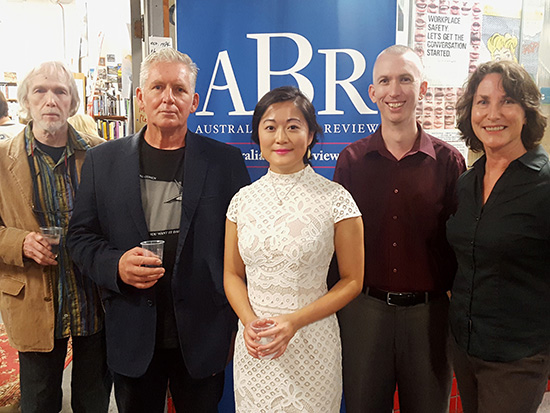 Porter Prize 2017
Porter Prize 2017
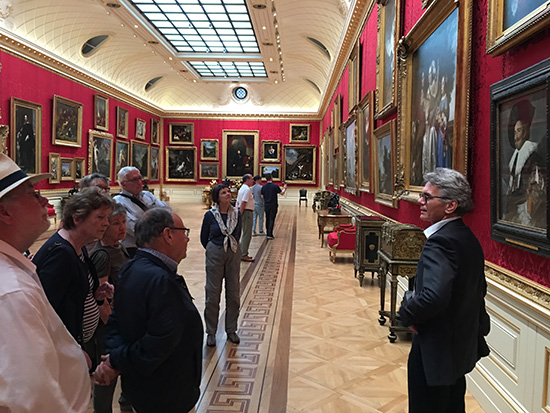 Christopher Menz leads the 2017 ABR UK tour.
Christopher Menz leads the 2017 ABR UK tour.
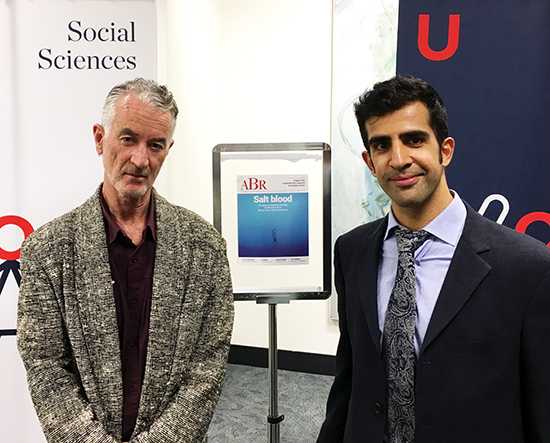 Michael Adams and Darius Sepehri at Calibre Essay Prize event 2017
Michael Adams and Darius Sepehri at Calibre Essay Prize event 2017
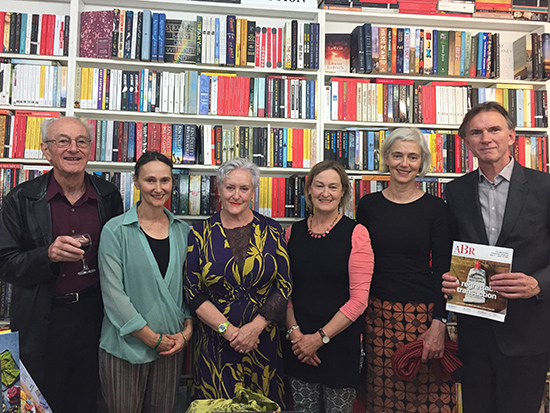 2017 States of Poetry Tasmania
2017 States of Poetry Tasmania
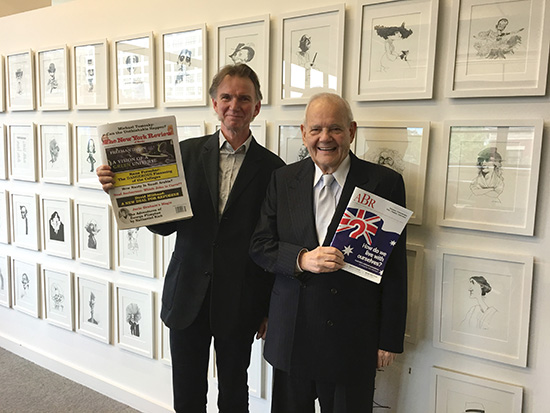 Peter Rose and Robert Silvers at NYRB 2016
Peter Rose and Robert Silvers at NYRB 2016
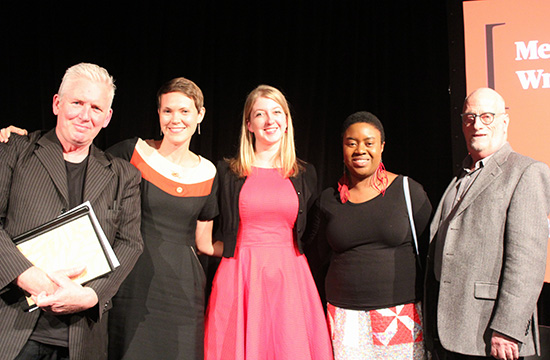
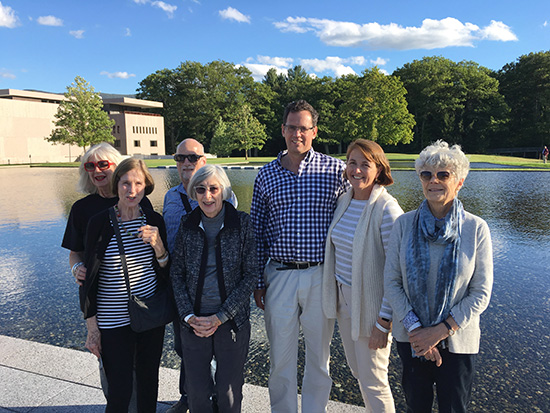 ABR US cultural tour at the Clark Institute 2016
ABR US cultural tour at the Clark Institute 2016
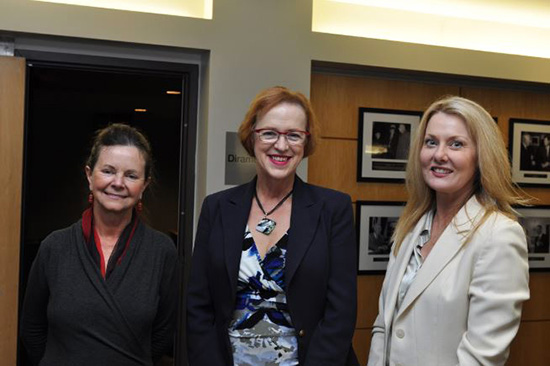 Geraldine Brooks Ambassador Caroline Millar Anna Funder ABR US tour 2016
Geraldine Brooks Ambassador Caroline Millar Anna Funder ABR US tour 2016
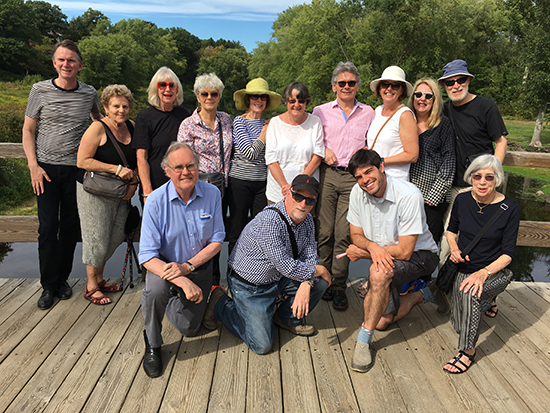 ABR US tour at Concord 2016
ABR US tour at Concord 2016
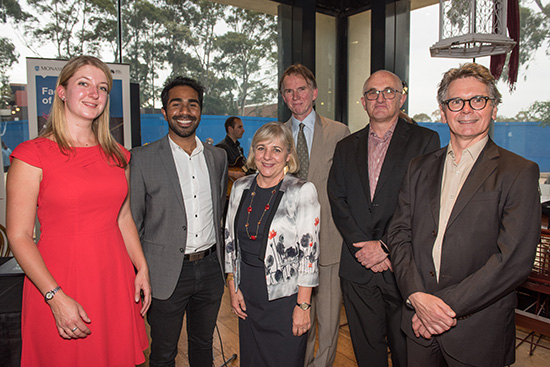 ABR team with Rae Frances at Monash launch 2
ABR team with Rae Frances at Monash launch 2
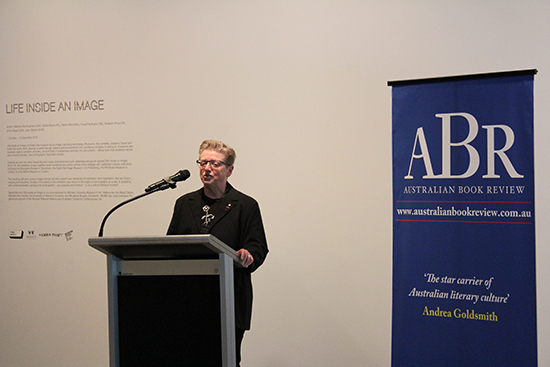 Robyn Archer launches the Arts issue 2016
Robyn Archer launches the Arts issue 2016
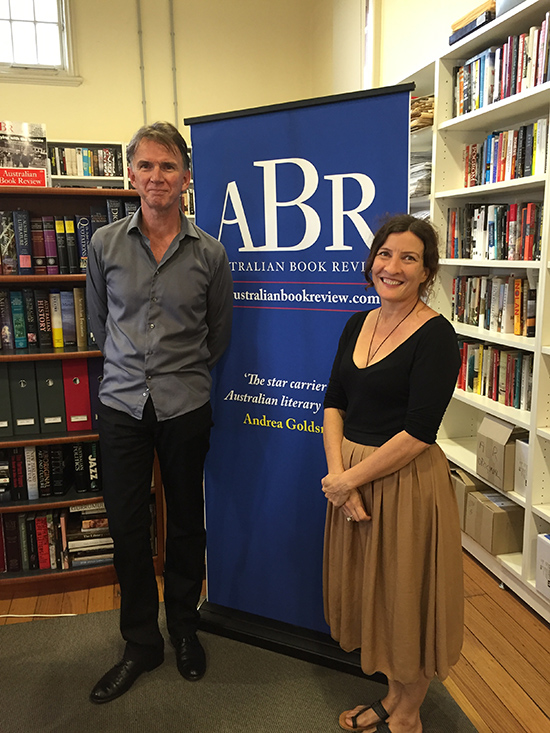 2016 Porter Prize Amanda Joy
2016 Porter Prize Amanda Joy
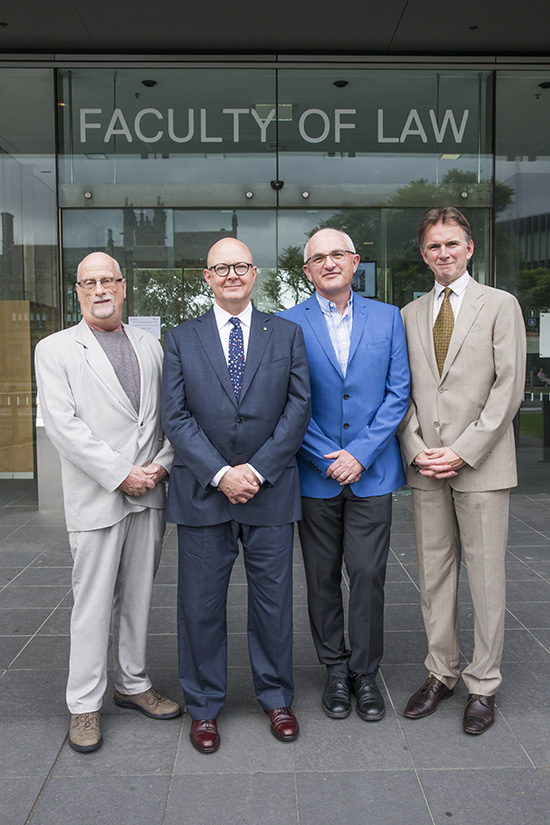 ABR Patrons Annual Lecture with Kim Williams 2016
ABR Patrons Annual Lecture with Kim Williams 2016
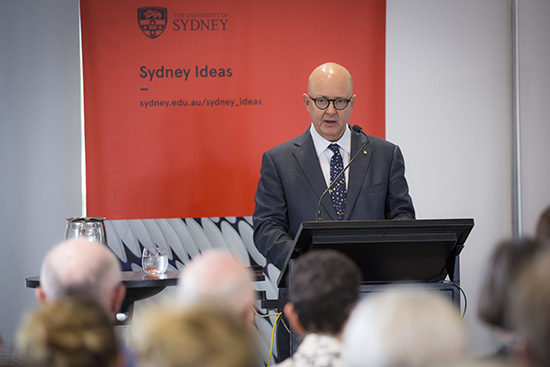 ABR Patrons Annual Lecture 2016 Kim Williams
ABR Patrons Annual Lecture 2016 Kim Williams
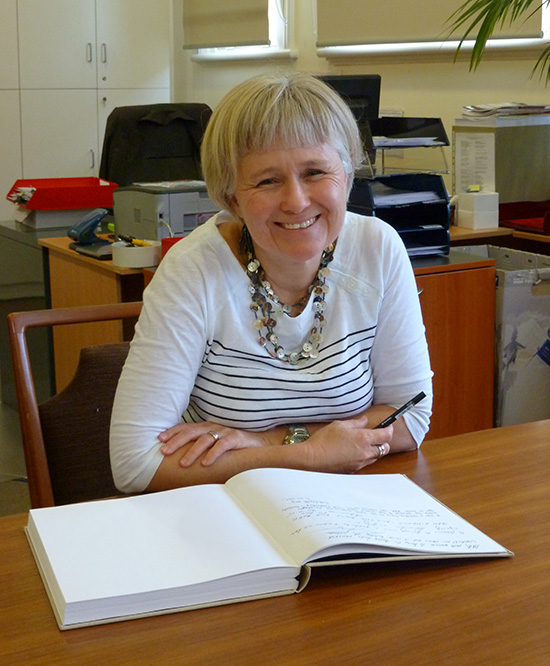 Ashley Hay visits the ABR office in 2015
Ashley Hay visits the ABR office in 2015
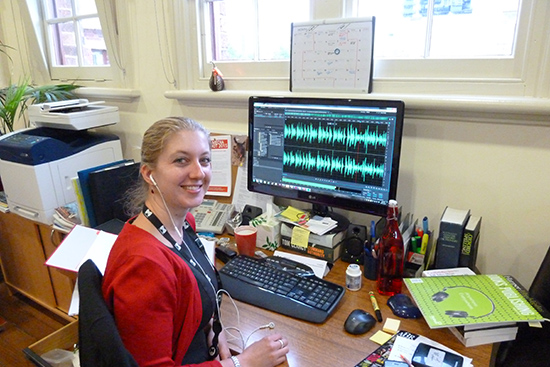 ABR Deputy Editor Amy Baillieu edits the first ABR Podcast in 2015.
ABR Deputy Editor Amy Baillieu edits the first ABR Podcast in 2015.
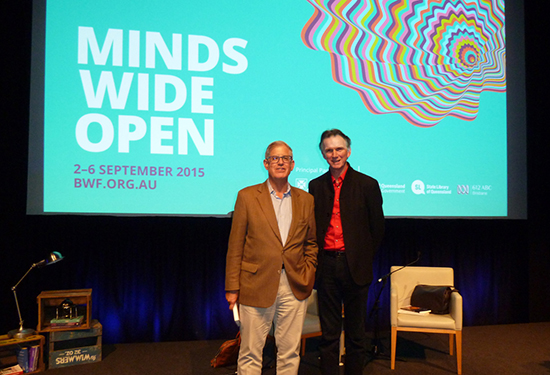 Jonathan Galassi and Peter Rose at the 2015 Brisbane Writers' Festival
Jonathan Galassi and Peter Rose at the 2015 Brisbane Writers' Festival
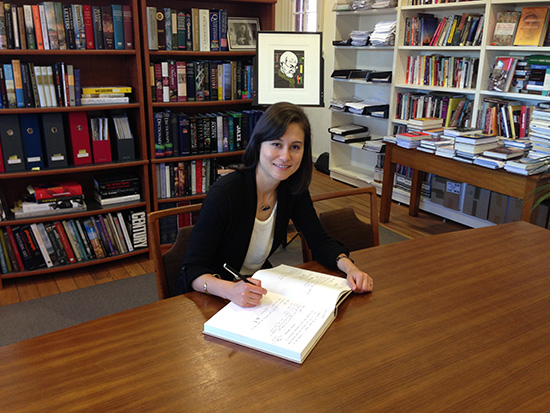 2014 Calibre Essay Prize winner Christine Piper signs the guestbook at ABR.
2014 Calibre Essay Prize winner Christine Piper signs the guestbook at ABR.
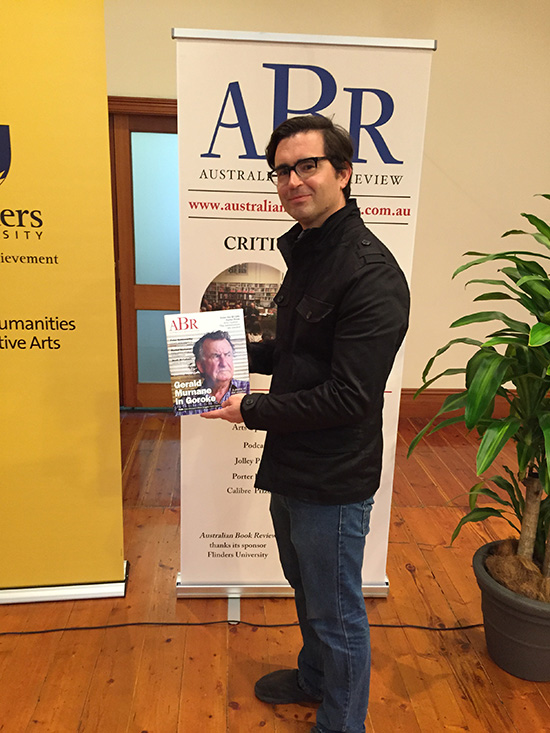 2014 ABR Patrons' Fellow Shannon Burns
2014 ABR Patrons' Fellow Shannon Burns
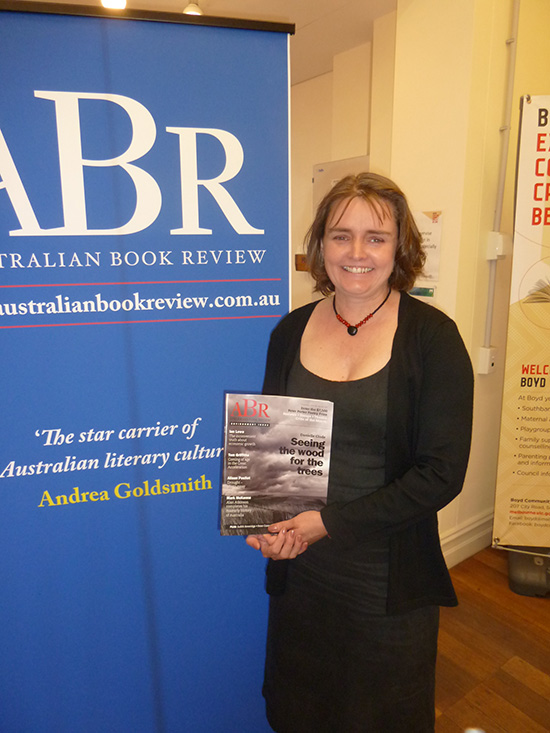 ABR Eucalypt Australia (formerly known as the Dahl Trust) Fellow Danielle Clode at the launch of the Environment issue, 2014
ABR Eucalypt Australia (formerly known as the Dahl Trust) Fellow Danielle Clode at the launch of the Environment issue, 2014
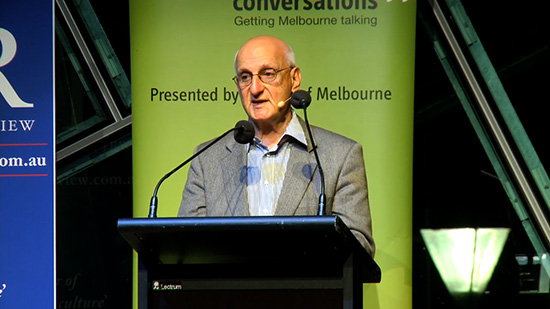 ABR Laureate David Malouf speaks at an ABR event, 2014
ABR Laureate David Malouf speaks at an ABR event, 2014
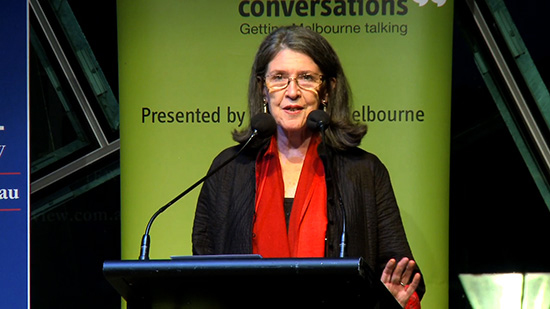 Morag Fraser speaks at an ABR event, 2014
Morag Fraser speaks at an ABR event, 2014
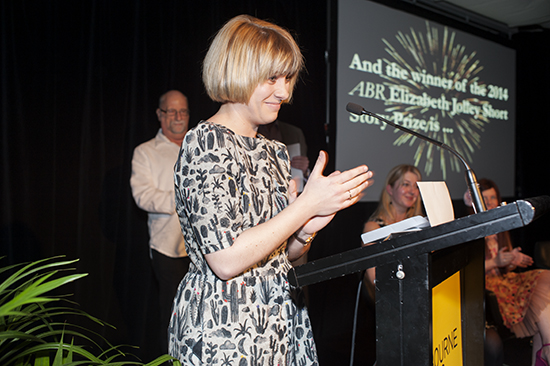 Jennifer Down wins the 2014 ABR Elizabeth Jolley Short Story Prize
Jennifer Down wins the 2014 ABR Elizabeth Jolley Short Story Prize
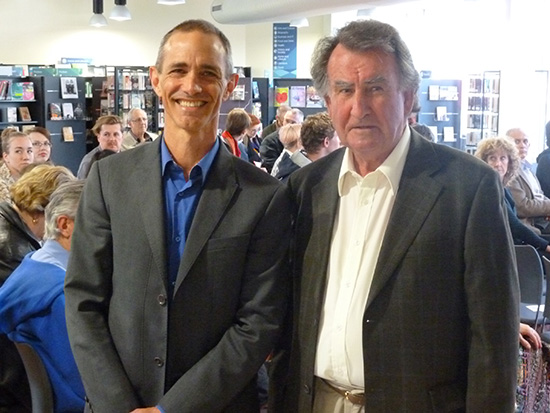 Andy Griffiths and Gerald Murnane at an event at Boyd, 2013
Andy Griffiths and Gerald Murnane at an event at Boyd, 2013
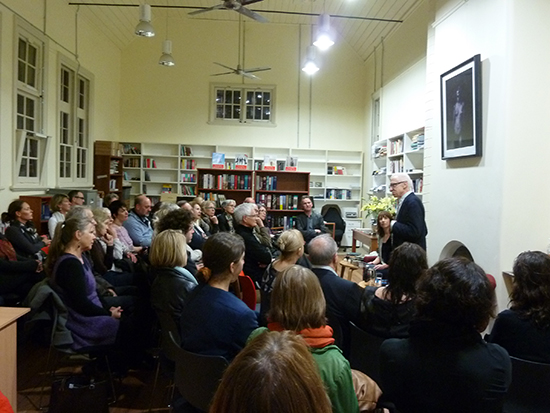 Lisa Gorton and Ian Donaldon speak at the first Fireside Chat at Boyd, 2012
Lisa Gorton and Ian Donaldon speak at the first Fireside Chat at Boyd, 2012
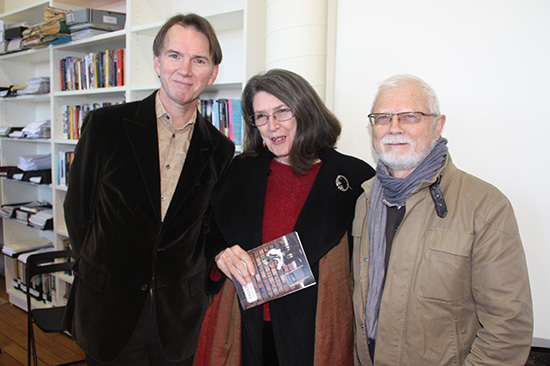 Peter Rose, Morag Fraser, and Rodney Hall at opening of Boyd in 2012
Peter Rose, Morag Fraser, and Rodney Hall at opening of Boyd in 2012
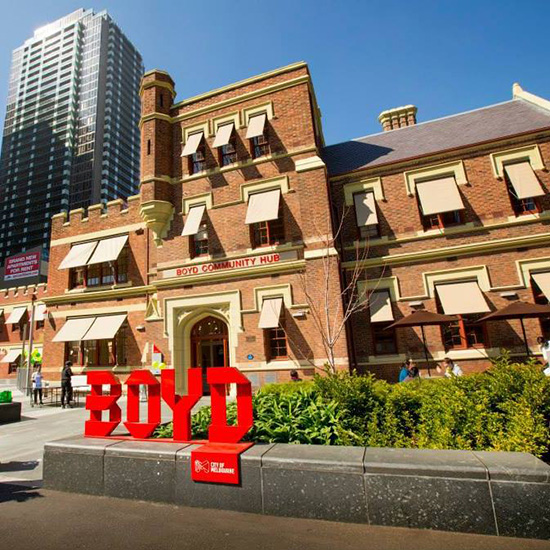 ABR moved to Boyd Community Hub in Southbank in 2012
ABR moved to Boyd Community Hub in Southbank in 2012
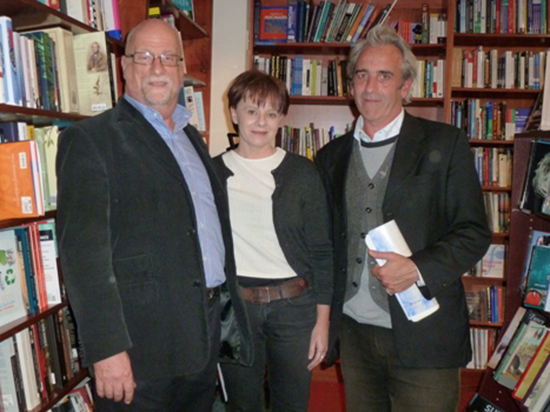 Ian Dickson, Carrie Tiffany, and Gregory Day at the 2011 Jolley Prize ceremony
Ian Dickson, Carrie Tiffany, and Gregory Day at the 2011 Jolley Prize ceremony
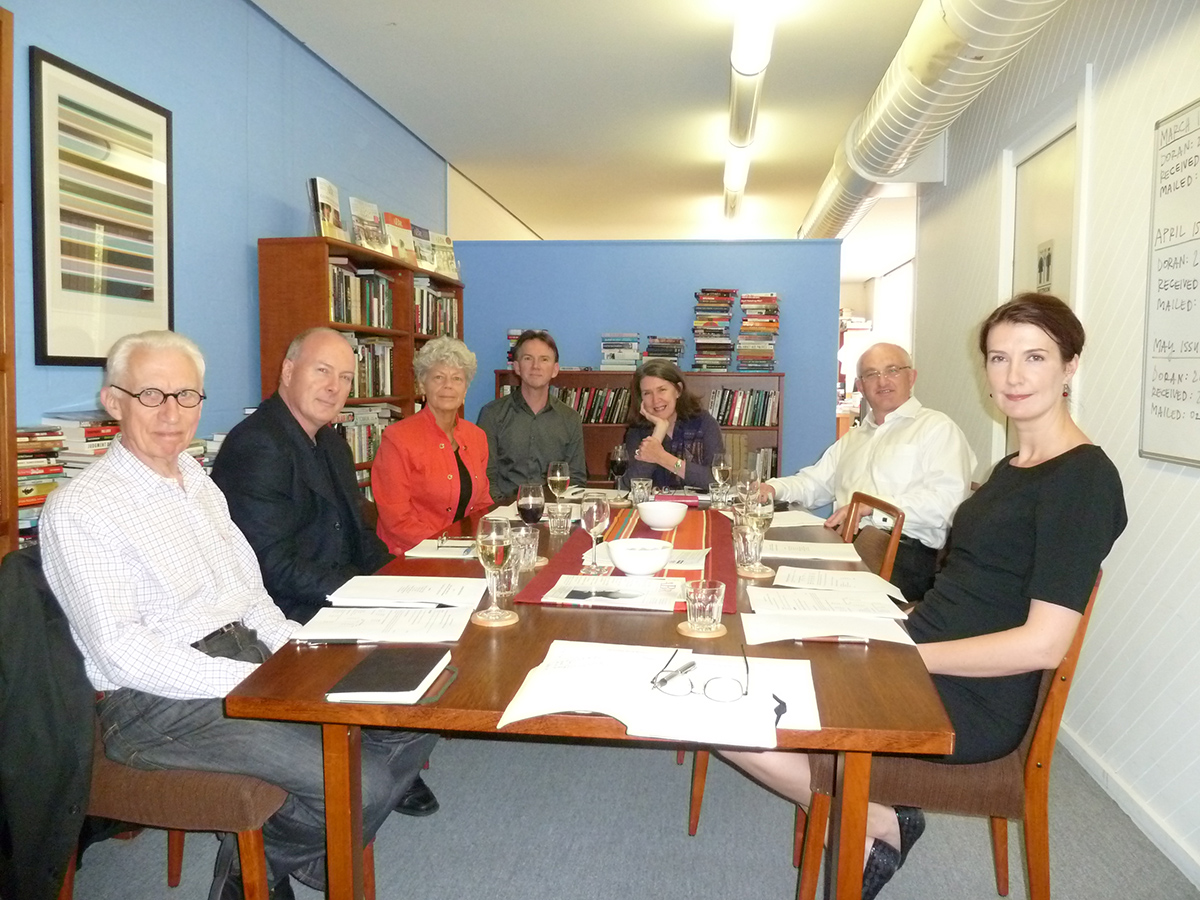 ABR Board 2011 Ian Donaldson, Paul Hetherington, Anne Edwards, Peter Rose, Editor Morag Fraser, Chair Colin Golvan and Anna Goldsworthy.
ABR Board 2011 Ian Donaldson, Paul Hetherington, Anne Edwards, Peter Rose, Editor Morag Fraser, Chair Colin Golvan and Anna Goldsworthy.
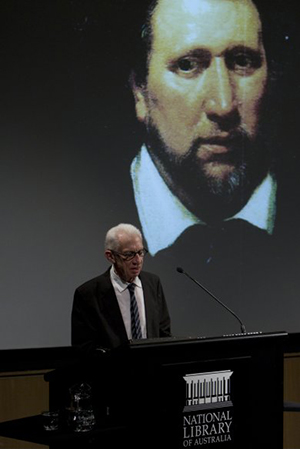 Ian Donaldson gives the ABR Fiftieth Birthday Lecture at the National Library of Australia in 2011
Ian Donaldson gives the ABR Fiftieth Birthday Lecture at the National Library of Australia in 2011
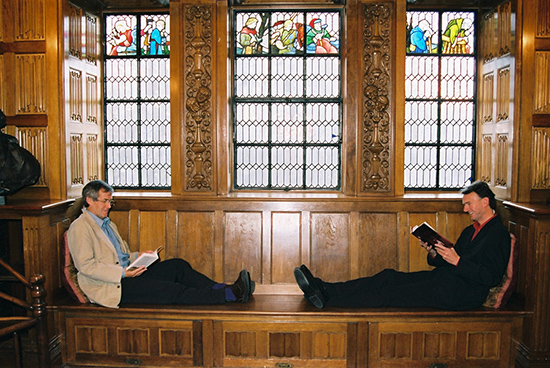 The 2003 National Biography Award was shared by Don Watson and Peter Rose
The 2003 National Biography Award was shared by Don Watson and Peter Rose
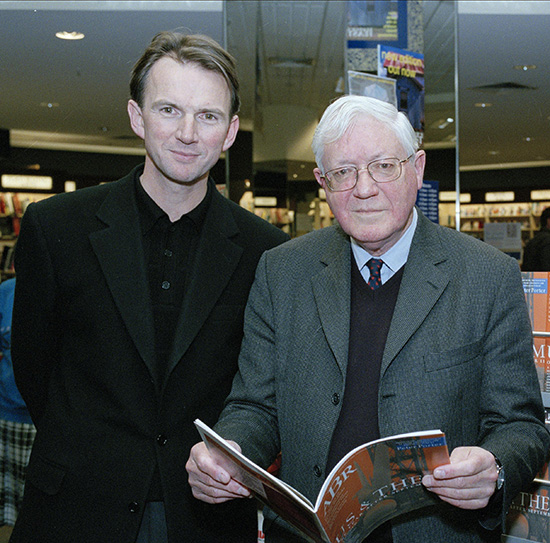 Peter Rose and Peter Porter 2002
Peter Rose and Peter Porter 2002
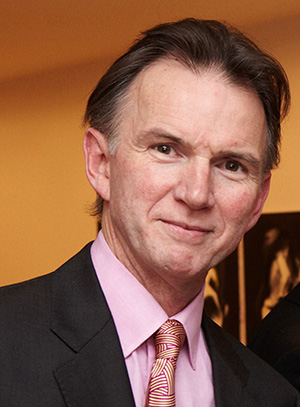 Current Editor and CEO of Australian Book Review, Peter Rose
Current Editor and CEO of Australian Book Review, Peter Rose
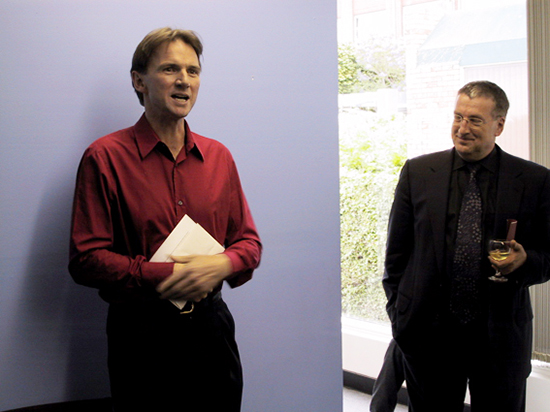 Peter Rose and Terry Cutler at the launch of the 2001 Summer issue
Peter Rose and Terry Cutler at the launch of the 2001 Summer issue
Media releases
2024
December 2024
Changes at Australian Book Review
November 2024
October 2024
September 2024
August 2024
![]() 2024 Jolley Prize winner announced
2024 Jolley Prize winner announced
July 2024
![]() Announcing a new ABR Rising Star
Announcing a new ABR Rising Star
June 2024
May 2024
April 2024
![]() 2024 Calibre Prize Shortlist announced
2024 Calibre Prize Shortlist announced
March 2024
January-February 2024
For arts companies, galleries, and film distributors
How do arts companies have their productions reviewed in ABR?
ABR publishes timely, extended, knowledgeable reviews of plays, operas, films, concerts of all sorts, dance, festivals and art exhibitions - most of them in Australia, with some from overseas. All reviews appear open-access at ABR Arts. Some later appear in the print edition.
If you would like a production from your company to be considered for review in ABR Arts, please send the relevant information by email to This email address is being protected from spambots. You need JavaScript enabled to view it.. Due to the volume of submissions and our small staff, we cannot guarantee a review and nor do we contact you personally to advise on the commissioning status. If a review is commissioned, a link to the review will be sent to you upon publication.
For publishers
Review copies
Australian Book Review welcomes the interest of publishers and self-published authors and encourages them to familiarise themselves with our publication. While ABR receives many books and cannot commission reviews of them all, we welcome unsolicited review copies of titles that meet ABR’s interests and purview.
Please send books to ABR:
Australian Book Review
Studio 2, 207 City Road
Southbank, VIC 3006
We may ask you for PDFs of certain titles that are especially time-sensitive or that are destined for reviewers in distant locations.
Advertising
ABR welcomes advertising and offers a variety of platforms and packages to suit different marketing strategies and budgets. This includes advertising in print, on our website, in our regular e-newsletters, and on our weekly podcast. ABR would be delighted to discuss circulation figures and characteristics, art requirements, timelines, prices, and package options. Please contact Amy Baillieu at This email address is being protected from spambots. You need JavaScript enabled to view it. or Georgina Arnott at This email address is being protected from spambots. You need JavaScript enabled to view it..
ABR Podcast
ABR’s weekly podcast features a mix of reviews, as read by the reviewer, and interviews with ABR contributors and book authors. While we welcome interest in the ABR podcast from publishers and are open to pitches from them, ABR commissions and produces all content on its podcast.
How do publishers have their books reviewed in ABR?
ABR encourages publishers and self-published authors to consider whether their book would be suitable for reviewing in ABR by familiarising themselves with the publication. We do not commission reviews for payment or in exchange for advertising.
If you would like a book from your publishing house or independent press to be considered for review, please fill out the form below and send it with a copy of the book to the ABR postal address. Due to the volume of submissions and our small staff, we cannot guarantee a review and nor do we contact you personally to advise on the commissioning status
About Australian Book Review
Australian Book Review (ABR), one of Australia’s major cultural magazines, presents high-quality journalism and new writing for the widest possible audience. It engages with all the arts, not just literature. It is diverse in terms of content, writers, and partners. It provides a needed forum for new Australian writers and reviewers, and it is committed to raising the standard of arts criticism in Australia.
ABR is an independent, not-for-profit monthly magazine, governed by an independent Board, managed by a small, skilled editorial and management team, and committed to the publication and promotion of creative and critical writing of the highest standard.
Created in 1961, it lapsed in 1974 and was revived in 1978.
Peter Rose is the Editor; and Sarah Holland-Batt is Chairperson of the Board.
ABR publishes reviews, essays, commentaries, interviews and new creative writing. The magazine is national in readership, authorship, distribution, events and partners. It is available in print and online.
Through ABR Arts, ABR engages with all the arts and publishes timely, extended reviews of new films, plays, operas, concerts, dance, festivals, and art exhibitions.
ABR’s diverse programs include three prestigious international prizes, writers’ fellowships worth as much as $10,000, themed issues, national events, cultural tours, and paid editorial internships.
ABR is committed to highlighting the strengths of critical and creative writing around Australia and presenting them to an international audience. We pay for everything we publish – print and online – and our rates have almost trebled in recent years.
ABR is a bona fide Deductible Gift Recipient (DGR). All donations of $2 or more are tax deductible. We have a successful philanthropy program which has helped to transform this magazine in recent years. Our many Patrons are listed elsewhere on the website.
ABR Timeline - Highlights
2024
Sam Ryan becomes ABR’s sixth Rising Star
Tracey Slaughter wins the Calibre Essay Prize
Dan Hogan wins the Peter Porter Poetry Prize
2023
ABR publishes the Indigenous issue
Sheila Fitzpatrick becomes ABR’s third Laureate
Tracy Ellis wins the Calibre Essay Prize
Dan Disney wins the Peter Porter Poetry Prize
Rowan Heath wins the ABR Elizabeth Jolley Short Story Prize
2022
Simon Tedeschi wins the Calibre Essay Prize
First ABR tour of the Adelaide Festival
Anthony Lawrence wins the Peter Porter Poetry Prize
Tracy Ellis wins the ABR Elizabeth Jolley Short Story Prize
2021
Sara M. Saleh wins the Peter Porter Poetry Prize
ABR adds an eleventh issue
Theodore Ell wins the Calibre Essay Prize
Camilla Chaudhary wins the ABR Elizabeth Jolley Short Story Prize
2020
A. Frances Johnson wins the Peter Porter Poetry Prize
Sarah Holland-Batt replaces Colin Golvan QC as Chair
ABR Behrouz Boochani Fellow Hessom Razavi writes about the pandemic
Yves Rees wins the Calibre Essay Prize
Mykaela Saunders wins the ABR Elizabeth Jolley Short Story Prize
2019
Richard Flanagan’s The Narrow Road to the Deep North is voted the Favourite Australian Novel of the twenty-first century in ABR’s second FAN poll.
Felicity Plunkett becomes the 2019 ABR Patrons’ Fellow
Andy Kissane and Belle Ling share the Peter Porter Poetry Prize.
Grace Karskens wins the Calibre Essay Prize
Sonja Dechian wins the ABR Elizabeth Jolley Short Story Prize
2018
ABR celebrates its fortieth birthday
Beejay Silcox becomes the ABR Fortieth Birthday Fellow
Third ABR Cultural Tour (Germany)
ABR Open Letter in support of the ABC signed by 100 writers/commentators/artists/public figures
2017
Four-year funding from the Australia Council
Four ABR Fellowships
Prominent role in the marriage equality campaign including our Open Letter
Michael Heyward is our first Publisher of the Month
2016
New partnership with Monash University
First ABR cultural tour (USA)
Robyn Archer becomes the second ABR Laureate
States of Poetry is launched
2015
Colin Golvan QC succeeds long-time Chair Morag Fraser
First Film & Television issue
2014
Inaugural Environment issue, with the first ABR Eucalypt Fellowship essay by Danielle Clode
Robert Adamson is the first Poet of the Month
David Malouf is named ABR Laureate
2013
Martin Thomas wins the Calibre Essay Prize for his essay “Because it’s your country”: Bringing Back the Bones to West Arnhem Land’ – our best-read online feature to date
Brian Matthews is our first Critic of the Month
Launch of ABR Arts, formerly Arts Update
2012
ABR moves to Boyd Community Hub in Southbank
2011
ABR Online is launched
Gregory Day and Carrie Tiffany share the renamed ABR Elizabeth Jolley Short Story Prize for their stories 'The Neighbour's Beans' and 'Before He Left the Family'
Patrick Allington is the inaugural ABR Patrons’ Fellow, his Fellowship essay 'What is Australia Anyway?: The Glorious Limitations of the Miles Franklin Literary Award’ appears in the June 2011 issue
Judith Bishop wins the renamed Peter Porter Poetry Prize for her poem 'Openings'
2010
Maria Takolander wins the first ABR Short Story Prize for her story ‘A Roānkin Philosophy of Poetry’
2009
Tim Winton’s Cloudstreet is voted the Favourite Australian Novel in ABR’s first FAN poll.
Michelle de Kretser is our first subject on Open Page
Mark Gomes becomes the first of many full-time paid interns
2008
Publication of the 300th issue in the second series. The issue includes a birthday feature with an Editorial from Peter Rose and tributes from contributors including Inga Clendinnen, Kerryn Goldsworthy, Richard Walsh, and Clive James.
2007
Elisabeth Holdsworth wins the first Calibre Essay Prize for her essay 'An die nachgeborenen: For those who come after'
2005
Flinders University becomes a sponsor
Stephen Edgar wins the first ABR Poetry Prize for his poem 'Man on the Moon'
2003
Former Editor Kerryn Goldsworthy reflects on the early years of ABR for the 250th issue in the second series
2002
La Trobe University becomes principal sponsor
2001
Peter Rose becomes the sixth Editor
ABR begins publishing new poems
Peter Porter writes at length about Sylvia Plath and Ted Hughes
2000
Tributes to Helen Daniel in the November issue
Aviva Tuffield wins the ABR Reviewing Competition
1998
With the closure of the National Book Council, ABR becomes fully independent
Publication of the 200th issue in the second series
ABR moves to Richmond from Carlton
1995
Helen Daniel becomes the fifth Editor; forum on the Helen Demidenko controversy
1991
David Malouf reviews David Marr’s biography of Patrick White
Robert Dessaix’s influential essay on multiculturalism, ‘Nice Work If You Can Get It’
1989
Rosemary Sorensen becomes the fourth Editor, succeeding Louise Adler
1988
In the 100th issue Manning Clark reviews Kate Grenville’s Joan Makes History
1986
Kerryn Goldsworthy becomes the second Editor
1978
Australian Book Review is revived, with John McLaren as Editor
1982
John Gorton writes about six Australian prime ministers
1961
Australian Book Review is founded in Adelaide by Max Harris and Geoffrey Dutton. This first series, edited by Max Harris and Rosemary Wighton, ran until 1974.

